the of FUTURE LAW

WINTER 2024 InRe THE MAGAZINE OF SOUTH TEXAS COLLEGE OF LAW HOUSTON
InRe Staff
Terri Parris
Editor-in-Chief Director of Strategic Communications, Marketing and Communications
James McAnear
Senior Graphic Designer, Marketing and Communications
Michelle Morris, Ed.D.
Consulting Editor Associate Vice President, Marketing and Communications
InRe is published by South Texas College of Law Houston for the law school’s alumni, students, faculty, staff, and friends. Please direct correspondence and inquiries to:
South Texas College of Law Houston
Attn: Terri Parris
1303 San Jacinto Houston, TX 77002-7006 713-646-1760 news@stcl.edu
COPYRIGHT 2024
SOUTH TEXAS COLLEGE OF LAW HOUSTON
ALL RIGHTS RESERVED
“I am proud to be a part of a law school community that not only acknowledges where it has been, but also takes a keen interest in equipping its students for the future. It is my firm belief we will need welltrained lawyers to address the challenges that technological innovation will present. In that regard, I am glad to see professors employ these tools in their classrooms, which will ensure our students are prepared to succeed in the future of the legal profession.”
The Hon. Jennifer W. Elrod, Circuit Judge, United States Court of Appeals for the Fifth Circuit, and Jurist-in-Residence, South Texas College of Law Houston

2
Texas
South
College of Law Houston






Features
4 THE FUTURE OF LAW
Lawyers and professors offer commentary and reflections about the legal profession in the coming decades.
12 ONLINE J.D. SUCCESS
The innovative online J.D. program launches, attracting dedicated, diverse students from across the nation.
14 HONORING A LIFETIME OF SERVICE
Associate Dean Cathy Burnett, who created the law school’s clinics three decades ago, is honored for her commitment to pro bono service.
18 A CASE FOR JUSTICE
Following a petition filed by STCL Houston, the U.S. Army overturns convictions of 110 Camp Logan soldiers involved in the Houston riots of 1917.
20 WHAT WOULD YOU DO?
John Quiñones inspires the audience during the second annual Agosto Diversity Lecture.
22 APPELL ATE EXCELLENCE
Michael “Mic” Davis ’23 argues and wins an appeal as a 3L.
31 ALUMNI AWARDS, CENTENNIAL GALA
During Reunion Week, three outstanding alumni recognized; crowd at the sold-out Centennial Gala contributes funds, dances the night away to the Spinners.
52 SALUTE TO RETIRING FACULTY
Alumni share memories, notes in honor of long-time Professors Phillip Page, Mark Siegel, and Mark Steiner.
54 FOUNDER ’S DAY CELEBRATIONS
Community helps the law school recognize Centennial Founder’s Day with presentations, proclamations, and celebrations.
Departments
3 MESSA GE FROM THE PRESIDENT AND DEAN
24 IN BRIEF
30 LE TTER FROM THE PRESIDENT, ALUMNI ASSOCIATION BOARD OF DIRECTORS
38 CL ASS NOTES
44 IN MEMORIAM
48 FACULTY NOTES
Cover
The circular, futuristic composition reflecting the future of law overlays Lady Justice, who symbolizes unbiased justice, the impartiality of the courts, and the power of the rule of law.
stcl.edu 1
THE MAGAZINE OF SOUTH TEXAS COLLEGE OF LAW HOUSTON | WINTER 2024
CONTENTS
4 12 18 20
31 54


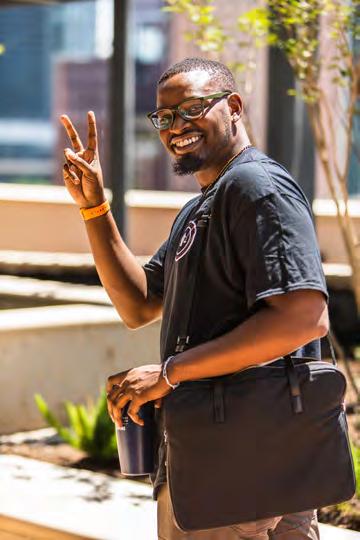



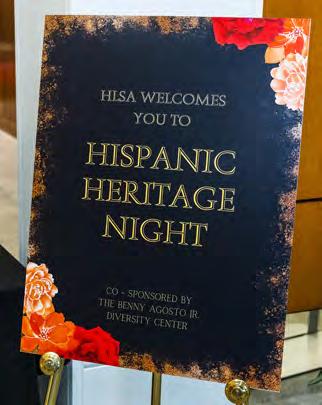




Dear South Texas Community:
Our Centennial year theme has been honor the past, celebrate the present, and build the future.
I have enjoyed seeing so many of you this year at our events, including our Founder’s Day celebration, the Alumni Association Luncheon, and our sold-out Centennial Gala. And I have appreciated the opportunity to share many stories this year about our founding by visionary Houston leaders in 1923, about our dedicated faculty and staff, and about the opportunity our law school has provided to so many over the past 100 years. Through the decades, South Texas has lived its mission of diversity, opportunity, excellence, and service.
We culminate our Centennial year with this issue of InRe, in which we offer stories that illustrate various aspects of our mission.
We celebrate Associate Dean Cathy Burnett’s Lifetime Achievement Award for Pro Bono Service – and the threedecade history of the legal clinics at our school.
We share the role that STCL Houston students, professors, and clinic attorneys played in petitioning the U.S. Army to overturn the convictions of the 110 Black soldiers denied due process and wrongly convicted in the aftermath of the Camp Logan riots.
Also, we discuss the future of law and legal education with alumni and professors to gain perspective about the coming decades of our profession.
As we wrap up this Centennial year, we are grateful to all who have contributed to our South Texas community over 100 years of excellence in legal education. And we look forward to all that South Texas College of Law Houston and its faculty, staff, students, and alumni will accomplish in the century ahead.
On to our second century!
All the best,
Michael F. Barry President and Dean
stcl.edu 3
Looking to the EMBRACING INNOVATION AND CHANGE FUTURE

South Texas College of Law Houston
“The nature and type of skills taught to future lawyers, as well as the substantive knowledge relevant in the 21st century, will depend upon the irreducible value of human beings to the law and legal processes. Tasks that require creativity, complex reasoning, or social intelligence (such as the ability to negotiate complex social relationships effectively) will remain the province of human beings. This must inform and shape legal education.
- Daniel Goldsworthy, The Future of Law in the 21st Century, Adelaide Law Review, Vol 41
When South Texas College of Law Houston was founded in 1923, change was in the air. Technology was poised to impact everyday life in many ways. Transportation was about to undergo an amazing transformation. Automobiles were replacing horses and carriages. Airplanes were becoming larger and more reliable, setting the stage for the development of the aviation industry. Communication and entertainment would be changed by the increasing popularity of three new inventions — the telephone, the radio, and films with sound.
Society also was changing. Women had fought for and won the right to vote. Some had joined the workforce in traditionally accepted female roles, while others were seeking an education that would help them build a career in male-dominated professions like law and medicine. Both groups of women were challenging assumptions about their place in the world.
The pace of change would only increase in the years to come. In 1923, how could they have known the next decades would bring the growth of the petroleum industry, recreational air travel, TV networks, the civil rights movement, nuclear power, the space race, the women’s movement, the moon landing, the gay rights movement,

and a hyper-connected world? The list goes on. Many of these developments brought with them subsequent changes in the practice of law and how law schools taught various subjects.
Here we are, 100 years later, ready to embrace the excitement and the challenges of the next century at South Texas. Rapidly advancing technologies combined with an accelerating pace of societal change have brought the legal community to a period of transformation. We are now, much like our founders were before us, perched on the threshold of new, disruptive technological advances and societal change. Obviously, no one can see into the future with perfect clarity. As South Texas embarks on its second century of legal education and the legal profession experiences a myriad of changes, it is an ideal time to reflect on potential societal disrupters and cultural trends that seem likely to reshape the future of law. Forces outside the courtroom and the academy are poised to impact everyday life.
At this important moment in time, we ask, “In the next century, what will shape the future of the legal profession — and the future of the law schools that teach and train the next generations of attorneys?”
stcl.edu 5
”
“What kinds of issues will future lawyers face? Increasingly, the legal profession is embracing the idea of lawyers letting their morals and values shape their approach to practice. What kind of lawyer do you want to be? Whom do you want to represent, or not? I think in the future, lawyers will increasingly think about expressing their own personal convictions and morality in their careers.”
– Dru Stevenson Wayne Fisher Research Professor, Professor of Law
TECHNOLOGY INTEGRATION
Generative AI
Technology has already begun to revolutionize legal practice and will impact the way law is taught. And at the forefront of the technological revolution is Generative Artificial Intelligence (AI). It can now be used to power legal research, write drafts of briefs, and streamline case preparation. Online services like Lexis/Nexis are launching AI products tailored for the legal community.
As the technology is refined, the future will witness further integration of AI in legal research, contract analysis, and even predictive analytics for case outcomes. South Texas College of Law Houston and other law schools will need to teach students how to use the technology effectively and efficiently to make them practice ready.
In the field of AI in particular, it seems there are more questions for reflection than answers. For example, should AI be used at all in legal education? If so, what are the most responsible ways to use AI? Will its use reduce the need for attorneys? How will aspiring young lawyers gain experience if computers are doing the basics at firms? How do we incorporate AI into law schools’ curriculum? Will we have AI judges deciding cases based on uploaded evidence?
“A few years back I did not make much of the breathlessness surrounding AI. It was clickbait. AI was always predictive...how will judges rule, how will juries decide? But now...it’s also generative, writing content and creating work product using settled rules. It’s obvious that it will enhance productivity by handling routine duties, allowing lawyers (and other people) to spend more time thinking and being creative.”
– Frank Fagan Associate Professor of Law
“The future is technology. Generative AI will provide short cuts by giving people a starting point, a rough first draft. But people need to remain aware of the bias risk in large language models (LLMs), and the risk of ‘hallucinations’ that can deceive users.”
– Josh Blackman Centennial Professor
of Constitutional Law, Professor of Law
“Professors in many fields, including law, have expressed worry about students using AI to cheat. Meanwhile, many law firms are moving ahead and using it to do some of the work traditionally done by first-year associates. AI programs can pass the national legal ethics exam, the Multistate Professional Responsibility Examination
6 South Texas College of Law Houston
(MPRE). This is clearly disruptive to the industry. In the long run, AI could help make representation more affordable to clients. And lawyers will be able to make better predictions about judges’ decisions on pre-trial motions and summary judgments.”
– Dru Stevenson Wayne Fisher Research Professor, Professor of Law
Virtual Education, Remote Proceedings
Virtual court proceedings and online legal instruction became the pandemic norm. Experts anticipate this trend to continue, potentially leading to better access to legal education and a more flexible and available legal system. Virtual courts can enhance efficiency, reduce costs, and make justice more accessible to individuals in remote areas.
Recognizing this future, South Texas instituted its American Bar Association (ABA) approved Part-time Online Program in fall 2023. This innovative approach to providing legal education is currently one of a handful of online law degree programs offered by an ABA-accredited school, and the ABA has indicated a willingness to allow a substantial increase in the number of online legal education programs across the nation.
While in-person hearings, meetings, and education remain important, virtual and remote options will be increasingly important to help keep the wheels of justice turning and improve access to legal education.
“Legal instruction will not be one hundred percent online. The in-person, live aspect is important. Online learning built with intention will create smaller groups of students with unique bonds and strong relationships, despite any geography that separates them.”
– Dr. Derek Fincham Associate Dean for Online Education and Innovation, Professor of Law
INTERDISCIPLINARY AND EXPERIENTIAL
Recognition of the need for interdisciplinary studies is growing, and some believe incorporating subjects like technology, business, healthcare, and environmental sciences into legal education will better prepare graduates for the multifaceted demands of modern legal practice and specialization.
Education experts see the increasing value of experiential learning in legal education and practice readiness. This trend affirms what South
“It is imperative that the next generations at STCL Houston not lose sight of the rigor we have always been known for...in admissions and in coursework. The focus should remain on well-rounded, practice-ready graduates. We develop good lawyers who go on to be good representatives of the school.”
– Michael Milich’ 97 STCL Board Member
stcl.edu 7
“We are moving toward the recognition that the third year of law school needs to be similar to how medical schools handle their third year...a junior practice under supervision...a transitional year.”
– Christopher Kulander Director Oil & Gas Institute, Professor of Law
Texas has known — and practiced — for decades. At the forefront of hands-on, clinical learning for more than 30 years, the coursework offered at South Texas, including through the Randall O. Sorrels Legal Clinics, will only increase in importance and value.
“Lawyers of the future who want to work in environmental and energy law will need to understand the technical aspects of how these complex businesses operate. Experiential knowledge will be key. Internships will be invaluable. Clients or employers will be looking for sound advice to help them manage risk, so lawyers will need to be able to apply legal precepts in a business context.”
– Chad Seely ’02 General Cousel, ERCOT
CHANGES TO TESTING
The LSAT is no longer mandated by the ABA for law school admissions, and the Texas Bar Exam is likely to undergo a second major overhaul in less than a decade. This anticipated change to the bar exam (dubbed “NextGen”) will affect aspiring lawyers and law school curricula, as it will test more for skills and rely less on rote memorization. For South Texas, the question becomes, “How will we ensure that our graduates are practice- ready for their careers and well-positioned to pass the bar exam?”
“The law school community is seeing a big push for more experiential learning, especially considering the emphasis on practical skills being tested on the NextGen bar exam. We are already at the forefront of this at STCL Houston. We have a variety of new and forthcoming advocacy courses and excellent clinical opportunities. I see a future where advocacy continues to gain more respect as a means of education, not just as a great extracurricular activity.”
– Dominique Hinson ’14 Director, Appellate Advocacy
DIVERSITY, EQUITY, AND INCLUSION
The emphasis on diversity, equity, and inclusion within the legal profession will remain a focus, particularly in multicultural and diverse cities like Houston. Efforts to increase the participation of
8 South Texas College of Law Houston
qualified members of marginalized groups among legal practitioners and in the judiciary will continue as society pursues a more equitable justice system that reflects the diversity of the population it serves.
Law schools will need to find innovative ways to support diverse and inclusive student bodies, particularly after the Students for Fair Admissions decision last summer. STCL Houston and the legal community at large will benefit from the Benny Agosto, Jr. Center for Diversity and other projects that seek to foster a successful legal education for all.
“The Benny Agosto, Jr. Diversity Center will become a driving force in bringing more people of all different backgrounds and beliefs into the legal community and bringing the community at large into discussions about important issues. The relevance of diversity will only increase as we move forward.”
– Prof. Shelby A. D. Moore Vice President, DEI, Professor of Law:
“The future of rights for LBGTQ+ people, and everyone else, comes down to politics.”
– Mitchell Avila Katine ’85 STCL Board Member
ALTERNATIVE DISPUTE RESOLUTION
With an increasing backlog of cases post-pandemic, alternative dispute resolution methods like mediation and arbitration continue to gain traction. The approaches can offer faster results, can be cost effective, and often are less adversarial in nature than proceedings that occur inside a traditional courtroom.
South Texas will continue to prepare its graduates for success, both in the courtroom and around the mediator’s table, and alumni will have more opportunities to utilize their skills in mediation and negotiation.
“At some point, almost every case is required to go to mediation, so it can seem transactional in nature. Earlier, more earnest engagement, with the end goal of settlement rather than trial, could yield better results for clients. It’s a bit of a paradigm shift, but rather than ‘alternative’ we see this process as ‘early dispute resolution.’ ”
– Debra Berman Director, Frank Evans Center for Dispute Resolution, Professor of Law
“Society will continue to ask, ‘Who is queer?’ The inevitable expansion of what it means to be queer will bring with it new terminology, new definitions, new boundaries, and new laws to police those boundaries.”
– Ryan
Nelson Assistant Professor of Law
stcl.edu 9
“In the future, early dispute resolution will become much more prevalent.
Law schools across the country will take a cue from South Texas College of Law Houston and invest more resources into teaching law students about early dispute resolution options. That training will become an integral and powerful part of every lawyer’s skill set.”
– Felicia Harris Hoss ’97 Harris Hoss PLLC
“The post COVID civil docket is terrifying. Harris County has the same number of judges on the bench now as in 2012, but almost twice as many cases pending. This is not due to a lack of effort on the courts’ parts but rather the capacity to make up for years of lost trial time. There is no way to clear the backlog other than using other methods of case resolution, like mediation and non-binding arbitration.”
– Denise Peterson ’10 Principal, PetersonADR
GLOBALIZATION AND INTERNATIONAL LAW
Law schools have offered courses on international law and global issues for many years. South Texas College of Law Houston continues to offer students summer study abroad and is committed to an ongoing relationship with the Charles University Faculty of Law in Prague.
With the world becoming ever more interconnected, students will have more opportunities for international internships and exchange programs, and alumni are likely to experience increased work with global clients.
“The study of international and comparative law not only allows students to learn about other legal systems and cultures, but it also makes them realize the unique role of the attorney in America.”
– Katerina Lewinbuk Director, International Programs, Professor of Law
ENVIRONMENTAL LAW, ALTERNATIVE ENERGY AND EMERGING FIELDS
As climate change continues to drive global agendas, energy and environmental law will remain front and center. Additionally, emerging fields such as space law, artificial intelligence law, and bioethics will demand specialized legal expertise.
Law schools are working to anticipate these emerging disciplines and prepare graduates for them. Many alumni are working on the leading edge of these important fields, helping create the emerging trends in energy and environmental law.
10 South Texas College of Law Houston
“Energy law has a critical role in creating a better future for all of us. Drought, fires, environmental issues, diversity of energy sources, the balance of supply and demand, our water supply -- issues we have taken for granted are now focal points.”
– Chad Seely ’02 General Counsel, ERCOT
“Artistic works created by AI will in all likelihood have no copyright attached to them. The code, or instructions, involved in creating them are copyrightable...the prompts are potentially copyrightable.”
– Frank Fagan Associate Professor
THE FUTURE OF LEGAL EDUCATION
In many ways, a profoundly different legal landscape lies ahead. However, the fundamental aspects of practicing and teaching law will remain the same.
As South Texas embarks on its second century, our law school remains committed to its long history of preparing graduates who are ready to meet the challenges of an evolving legal career. South Texas prepares practice-ready attorneys; it is a hallmark of the school.
In doing so, we will remain true to our commitment to the broader principles of South Texas: providing the opportunity to get a law degree, making sure the underrepresented have a voice, understanding that the concept of service is integral to our community, fostering excellence, and knowing our mission really makes a difference.
Just as the legal profession will continue to ponder the questions and study the trends, our law school will do so as well. While we may not know the answers yet, we do know we must prepare our graduates to be adaptable to changing environments, technologies, and novel areas of the law. Our graduates will need to be more empathetic and more capable of solving problems, and more attuned to the needs of clients.
Our graduates must be attorneys and counselors, prepared to do what technology cannot: Care.
“We at South Texas College of Law Houston are already answering the call of the future. We are leading the way forward in holistically understanding experiential education. The changing business climate demands lawyers adapt to changes in client needs, and our approaches to teaching resolution meet that need.”
– Dominique Hinson ’14 Director, Appellate Advocacy
stcl.edu 11
NEW ONLINE J.D. SCHEDULE ATTRACTS STUDENTS FROM ACROSS NATION

A firefighter, a paralegal, an immigration officer, a teacher, a neighborhood volunteer, a farmer... what unites them?
They are among the 33 students from nine states who form the inaugural cohort of South Texas College of Law Houston’s new American Bar Associationaccredited Part-time Online J.D. Schedule.
The law school received more than 430 applications for the 33 spots. Students in the program range in age from 22 to 66, and they are attending from across Texas, as well as from Arizona, Colorado, Georgia, Idaho, Mississippi, New Mexico, Utah, and Washington.
“South Texas designed the online schedule to provide a rigorous program of legal education to individuals who are unable to pursue a law degree because of geographic limitations, family and job commitments, and life circumstances,” said President and Dean Michael F. Barry. “These outstanding students will have to work just as hard as our in-person students as they pursue their Juris Doctorate (J.D.) degree – they just will not have to relocate to Houston to do so.”
The students earning their J.D. through the online schedule came to the downtown Houston campus in August for a oneweek residency period. They will return to campus in each of the following years, as well.

“The students selected for this program have started strong, and they bring diverse professional and life experiences to add to discussions,” said Dr. Derek Fincham, associate dean for online education and innovation. “Their demographics, test scores, and academic success mirror the students in the law school’s full-time and part-time oncampus programs.”
Fincham noted that the courses for the online schedule were built specifically for this format and incorporate the best practices for online teaching and learning.
While law schools across the country are adding countless online courses to their schedules, South Texas Law is one of
12 South Texas College of Law Houston
Dr. Fincham leads online JD student orientation


approximately one dozen law schools in the nation approved by the American Bar Association to host a predominantly online program.
One of the goals for launching the program was to provide access to students in rural parts of Texas and surrounding states who did not live near a law school – places where there is a shortage of attorneys and limited access to justice. That goal has been achieved, with the overwhelming majority of students coming from such communities.
Many of the 33 students have wanted to attend law school for years but were unable to do so until South Texas began this program – and they have expressed great appreciation to the law school for the opportunity to pursue a legal career. The students in the program also have already connected with one another, and they are excited to be part of the first group studying in the online schedule.
“I am most excited about learning alongside such a diverse and intelligent group of individuals,” shared one student. “The residency week revealed what a truly extraordinary cohort we have.”
If you know of someone interested in enrolling in the Part-time Online J.D. Schedule that begins in Fall 2024, they can learn more at stcl.edu/admissions or contact the Office of Admissions at admissions@stcl.edu.

MEET SOME OF THE INTERESTING STUDENTS ENROLLED IN NEW ONLINE J.D. PROGRAM
William “Bill” Colley bypassed law school after graduating from college in the 1990s, then took a path that led him to a career as a patrol sergeant in Spring, Texas. Now 49 with a family and a varied work schedule, Colley thought law school was not an option until he learned about South Texas’ online J.D. schedule. “I pray my practical exposure to the law will aid me in my studies,” he said. “Law school offers a vast array of professional opportunities for me, and I am thrilled to see where I land.”
Shawna Dieckmann, a court judicial assistant employed by the State of Colorado, sits in on many district court hearings as part of her job. She loves to learn and wanted to know more about the law than she could glean from observing court sessions. With a full work schedule and no convenient law schools nearby, Dieckmann found the online J.D. program at South Texas to be just the option she needed. The structured class and discussions that allow for learning are her favorite parts of her law courses.
With three seasoned attorneys in his family, Remington Ruiz dreamed of attending law school since graduating from the University of Texas at Austin. After starting to work for a law firm and studying for the LSAT, Ruiz was drawn into Austin’s tech industry for a decade. But “the dream of law school never faded, and the regret of stepping away kept growing,” he said. His wife encouraged him to give law school another shot. “I’m looking forward to the arduous journey that lies ahead,” he said.
Houston Homicide Detective Roberto Montalvo — a military veteran with an MBA, a wife, and a 3-year-old son — hopes his experience testifying in criminal court murder trials will bring value to his legal education. In his job, he has worked closely with the assistant district attorney and district criminal judges. “I’m so excited to have the chance to learn about the law,” he said. “I know the life balance will be challenging, but it’s worth it.”
stcl.edu 13
Professor Ken Williams teaches an online class
Online JD students participate in orientation led by Dr. Fincham
Online JD students attend orientation in The Fred Parks Law Library
Lifetime Achievement Award Reflects Dean Burnett’s Vision for Pro Bono Service
More than three decades ago, Professor Cathy Burnett drew together a handful of students — in a small, converted gas station filled with borrowed, mismatched furniture — because she saw a need and believed law students could play a role in filling it. Eventually, the group grew to include other law professors, staff attorneys and support personnel.
She created South Texas College of Law Houston’s first legal clinic in August 1990, offering free legal services to the Greater Houston community. Burnett is now the law school’s vice president, associate dean for experiential education, and a professor of law, and she has taught and mentored hundreds of law students over the course of a career that spans 36 years.
This fall, Burnett was selected to receive the 2024 Lifetime Achievement Award from the Association of American Law Schools’ (AALS) Pro Bono and Access to Justice Section. She was recognized Jan. 4 in Washington, D.C., at the AALS’ 2024 Annual Meeting.
South Texas President and Dean Michael F. Barry said, “We are so proud of Dean Burnett’s well-deserved recognition. Service is one of the hallmarks of the South Texas mission — and Dean Burnett has exemplified that aspect of our mission with dedication, imagination, and vision for more than three decades.”
The letter notifying Burnett of her award noted, “Our subcommittee was inspired by the span of your exemplary and legendary career, your transformative impact on clinical education and the legal community as a clinic director, and as a leader in public service. We absolutely loved learning about the first clinic you started out of a converted gas station. We were truly moved to learn about all you have done. As your nomination letter said, the ripple effect of your work is tremendous.”
Burnett said it was an unexpected honor to receive the AALS award, and she is quick to point out that the success of the clinics and the school’s strong pro bono legacy are the result of the persistent efforts of many people.
“‘My’ achievement was only possible because of our law school’s consistent support for the blend of skills training with community service that drives our clinics,” Burnett said. “I share this honor with the dedicated faculty, public interest attorneys, professional staff, and committed students who make the promise of our clinics a reality. The chance to work with all these folks has made my professional life a joy. And I am grateful for those opportunities and our community.”
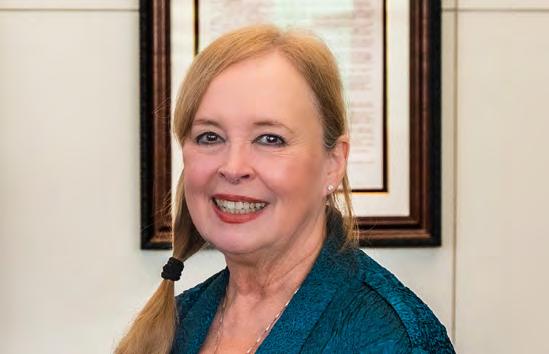
The strength of Burnett’s pro bono/public service vision is as robust today as ever, and the law school has backed up her vision with a 15,000-square-foot “law firm” space comprising the entire 10th floor of the South Texas tower and a staff that includes 17 attorneys (in addition to faculty and adjuncts), four paralegals, and four coordinators. The school also supports the clinic with operating funds, a public service track of courses that often includes more than 20 different legalclinic courses in a year, and an emphasis on service as a key component of a South Texas legal education.
The clinics rely heavily on grants and donor funds, and the success and impact of the clinics’ work has resulted in generous grants from organizations like the Texas Access to Justice Foundation (TAJF) and the Rockwell Fund as well as individual donations.
While Dean Burnett’s work at the law school alone would merit the Lifetime Achievement Award, the impact of what she started in that small gas station down the street from the law school has spread across Greater Houston, across the State of Texas, and across the nation. The clinics have served more than 13,000 families in the past 33 years — through TAJF-funded projects alone.
Where It All Began
The first clinic launched by the law school more than three decades ago offered assistance for indigent individuals with disabilities fighting for Social Security benefits. As the community’s needs shifted, Burnett added more clinics to respond to the unmet needs of the day.

14 South Texas College of Law Houston
Some of the current issues addressed by the clinics at South Texas Law include housing/landlord relationship issues and eviction defense (a huge crisis during the pandemic); a medical/legal partnership with Harris Health and UTHealth; and an opioid-use disorder clinic.
From the beginning, Burnett’s vision combined law students who wanted practice-ready legal skills, individuals in the community who needed representation but could not afford attorneys, and a desire to address gaps in service across the city.
The impact of Dean Burnett’s vision for a model clinical education program has equipped and inspired thousands of students who participated in the clinics as well as the staff attorneys who worked in the program. They, in turn, have carried their skills, knowledge, and passion for pro bono/ public service work into law firms, government service, organizations, and dedicated nonprofits like Lone Star Legal Aid, Houston Volunteer Lawyers, and Beacon Law.
Impact of the Clinics
The ripple effect is tremendous. As just one example, Ellyn Haikin Josef served as staff attorney for the domestic violence clinic at South Texas College of Law Houston from 2002-07, then was hired by Vinson & Elkins to serve as its first-ever full-time pro bono counsel. Now she supports the pro bono service of hundreds of attorneys across the country and around the world.
“Anything I ever learned about managing pro bono work I learned from Cathy. Today — every day — she is still representing the indigent and trying to ensure they have access to justice. There is not a pro bono corner of this city that does not know Cathy. Nor is there an organization that doesn’t want her on their board, serving as a voice of knowledge and wisdom.”
With Burnett at the helm of the law school’s pro bono/public service work, the Supreme Court of Texas — through TAJF — has selected South Texas Law four times in the last 10 years as the Access to Justice Law School Commitment to Service Award recipient.
“There is no doubt in my mind that the model of clinical education Dean Burnett has built at South Texas College of Law Houston has influenced pro bono work across firms, other law schools, and nonprofits across Texas,” said Jessie Campbell, supervising attorney for Lone Star Legal Aid’s private lawyer involvement program. “ People who have had a relationship with the South Texas clinics really understand what it means to be a pro bono attorney.”
Betty Balli Torres, executive director of TAJF, noted, “Our records show that South Texas College of Law Houston — in programs funded by TAJF grants — served 13,651 families from 1992 to 2022 — all under Dean Cathy Burnett’s leadership.”
Each clinic of the Randall O. Sorrels Legal Clinics at South Texas Law is like a mini law firm. The courses teach doctrine and skills –interviewing clients, developing a case strategy, interacting with opposing counsel, and document drafting. Cultural humility and teamwork are also part of the coursework. Students consult with one another and with professors.
During the past academic year, the clinics’ law students collectively provided 15,086 hours of pro bono clinic service. These students work with real clients under the supervision of licensed attorneys.
Burnett said students grasp they are truly becoming lawyers when they first help real clients in a clinic. “When they experience for the first time that their knowledge and skills can make a difference in someone’s life, it is heady,” she said.
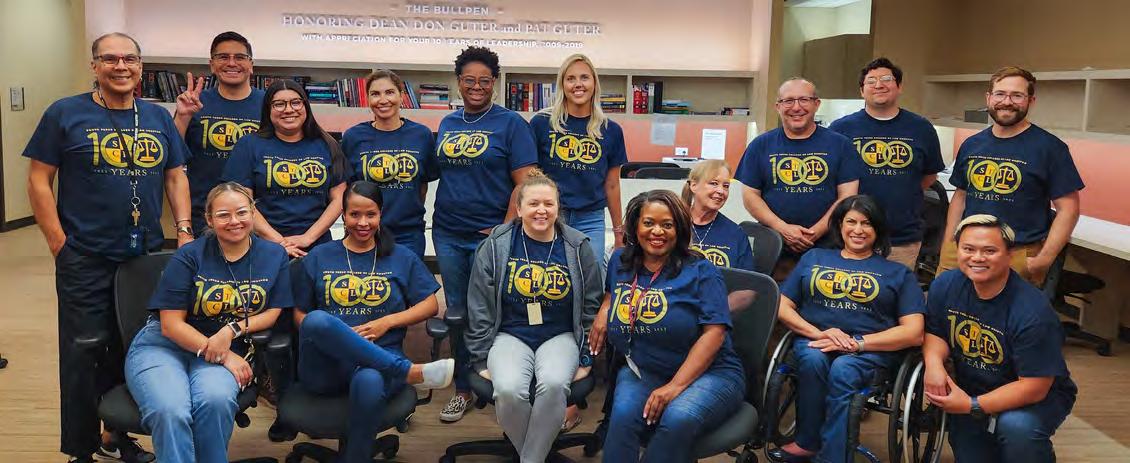
stcl.edu 15
The staff and faculty of the Randall O. Sorrels Legal Clinics enjoy serving the Greater Houston community
PROVIDING LEGAL AID TO UNDERSERVED COMMUNITIES
Texas Bar Foundation Grant Supports Low-Income Tax Clinic
The Texas Bar Foundation awarded South Texas College of Law Houston $26,400 to fund post-graduate fellowships in the Low-Income Tax Clinic (LITC).
Under the direction of the LITC faculty and staff, current law students enrolled in the Low-Income Tax Clinic course assist clients in negotiating with IRS examining agents, filing protests with IRS Appeals, negotiating with appeals officers, preparing and filing petitions with the U.S. Tax Court, and addressing collection through mechanisms such as preparing offers in compromise.
The LITC is part of South Texas Law’s Randall O. Sorrels Legal Clinics. Professor Bruce McGovern is the professor of law in charge of all tax clinics and director of the LITC. Jeff Gold is the LITC’s assistant director, a public interest attorney, and an adjunct professor. McGovern and Gold will supervise the post-graduate fellows.
The LITC post-graduate fellows will plan, manage, and execute monthly community outreach events and educational programs for the clinic. This is vitally important because the tax clinic receives funding from the Internal Revenue Service and is required to provide educational programming for low-income communities. Also, providing relevant work experience for
post-graduate fellows promotes and encourages a public interest attorney pipeline for postgraduates at the law school between graduation and bar exam results.


The LITC helps meet the significant need in the region for pro bono tax assistance. Staff and students assist clients at approximately four Tax Court events in
Houston each year. The clinic receives a significant number of requests for assistance from area residents who have received notifications from the IRS and the Tax Court that include contact information for STCL Houston’s LITC.
Since its inception in 2016, the law school’s LITC has served low-income taxpayers in the Houston metropolitan area, including those in suburban and rural communities surrounding Houston. Over the last seven years, the LITC has opened a total of 293 new cases, and the workload has steadily increased. In 2022 alone, the LITC opened 39 new cases and worked a total of 126 cases.
“We are grateful to the Texas Bar Foundation for this generous grant to fund fellows who support our tax clinic benefiting low-income individuals and families,” said Catherine Greene Burnett, vice president, associate dean for experiential learning, and professor of law. “Low-income Texans need free or low-cost legal information and representation now more than ever.”
Since its inception in 1965, the Texas Bar Foundation has awarded more than $26 million in grants to law-related programs. Supported by members of the State Bar of Texas, the Texas Bar Foundation is the nation’s largest charitably funded bar foundation.
STCL Houston Receives Grant to Provide Legal Services to Individuals, Families Affected by Opioid-Use Disorder
The Texas Access to Justice Foundation (TAJF) has awarded South Texas Law a $200,000 grant to provide basic civil legal services to indigent individuals directly affected by opioid-use disorders. Stephanie McKernan ‘20 directs the program.
Anyone who has been affected by the opioid-use disorder of a family member may qualify for assistance with legal issues. The list includes parents, children, spouses, legal guardians, and other relatives or caretakers.
16 South Texas College of Law Houston
Bruce McGovern
Jeff Gold

To receive services through this grant-funded program, individuals must earn less than than 200% of the federal poverty guidelines ($27,180 annual income for a household of one; $55,500 for a household of four).
“We are honored the law school was selected to help serve individuals and families impacted by the tragic and widespread opioid-use crisis,” said Cathy Burnett, associate dean for experiential education.
A U.S. Congressional Budget Office report released in 2020 noted that opioid misuse increased during the pandemic because of worsened mental health, more social isolation, greater job losses, and reduced access to treatment. Also, the report noted, the use of more potent synthetic opioids led to a sharp increase in overdose deaths.
The free legal services funded by the grant will be provided through the Randall O. Sorrels Legal Clinics at STCL Houston, which offers legal services to the community through an in-house law firm staffed by licensed attorneys. Law students work in the legal clinics alongside the attorneys as part of their experiential education.
The 87th Texas Legislature appropriated $5 million from the opioid settlement fund to make the TAJF’s Legal Aid for Opioid-Use Disorder Grant Program possible.
“We look forward to working together to provide high quality civil legal services to individuals and families in Texas impacted by opioid-use disorders,” wrote Betty Balli Torres, TAJF executive director, in the award letter.
TAJF is the leading funder of civil legal aid to the poor in Texas. Created in 1984 by the Supreme Court of Texas, TAJF support for civil legal aid benefits hundreds of thousands of low-income Texas, including victims of crime, abused and neglected children, veterans, the elderly, and the homeless.
stcl.edu 17
Justice for Camp Logan Soldiers

More than a century ago, due process was denied to 110 Black U.S. Army soldiers — soldiers who were willing to defend their country, but who nonetheless had no voice in their own defense.
In October 2020 and December 2021, South Texas College of Law Houston — with the help of several professors, numerous law-student researchers, and a library archivist — petitioned the U.S. Army requesting a review of the courts-martial convicting the soldiers of the 3rd Battalion, 24th Infantry Regiment (also known as the Buffalo Soldiers).
In November 2023, Secretary of the Army Christine Wormuth approved the recommendation of the Army Board for Correction of Military Records to set aside all the courtsmartial convictions. The soldiers’ records will be corrected to indicate that each received an honorable discharge, and survivor benefits will be afforded to their descendants.
During a ceremony at the Buffalo Soldiers Museum honoring these soldiers, South Texas College of Law Houston was credited for the important role it played in helping achieve this historic and groundbreaking result.
“I am very proud South Texas played such a significant part in helping to correct this terrible wrong,” said President
and Dean Michael F. Barry. “Former South Texas Professors Geoffrey Corn and Dru Brenner-Beck dedicated themselves to this fight for justice. And to achieve this outcome, it took the contributions of many, including Heather Kushnerick, Special Collections Librarian & College Archivist in The Fred Parks Law Library, numerous students who are now alumni, and the support of Associate Dean Cathy Burnett.”
The Houston Riots took place Aug. 23, 1917, following months of racial provocations against members of the 24th — including the violent arrest and assault of two Black soldiers. Following the assaults, and amid rumors of additional threats to soldiers, a group of more than 100 Black soldiers seized weapons and marched into the city, where clashes erupted. The violence left 19 people dead.
In the months that followed, the Army convicted 110 soldiers in a process that was characterized by numerous and substantial irregularities — including that the individual representing the accused was not a licensed attorney. Thirteen of the convicted men were executed immediately in the largest mass execution of American soldiers by the U.S. Army; six more were executed in the following weeks.
18 South Texas College of Law Houston
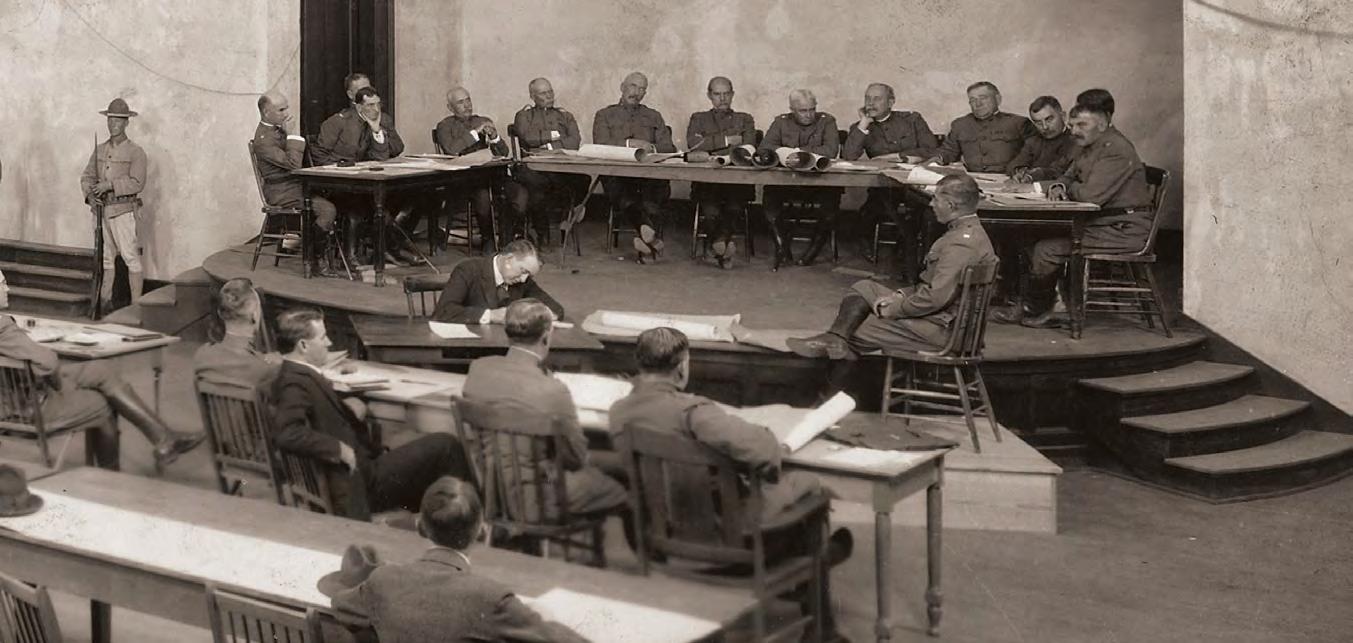
The Story Behind The Story
Over a two-year period, dozens of students enrolled in the Actual Innocence Clinic courses taught by Burnett and Brenner-Beck. They were responsible for researching the stories and military records of each of the Camp Logan soldiers. The students’ research, along with work by the professors, was the backbone of the petitions submitted to the Army.
Burnett said, “This project was very important to all the students who worked on it, and they spent hours and hours researching the situations of individual soldiers. Some of the students were veterans, and their nuanced understanding of military culture contributed to their research efforts.”
Ashley Cromika’s interest in finding justice for the soldiers started in the fall of 2020, when she enrolled in the Actual Innocence Clinic course.
“Dean Burnett assigned each of us different soldiers to research — that was the start,” said Cromika, who graduated with her J.D. in May 2021 and is now an attorney at the Houston firm
Garate & Associates. “The more I studied their stories, the more intensely interested I became in finding justice for these men. I realized we might be able to do something, even if more than 100 years after the fact.”
Because the world was in pandemic lock-down at the time of her research, Cromika opened a research account with the National Archives and filled many notebooks with research about the soldiers, the trials, letters to family, background about racism at that time in the U.S., and more.
“I asked so many questions and requested so many documents, I think my connection at the National Archives might have been happy when I wrapped up my research,” Cromika said. The heavily documented PowerPoint presentation she created was so informative it was included in the addendum of the petition sent to the U.S. Army.
“This is something so near and dear to me,” Cromika said. “Much of my research was heartbreaking, and it’s hard to talk about it without crying. Some soldiers wrote letters to their families that did not arrive until after their son was executed. We wanted to do anything we could to help all those men get justice. I am proud I got to be part of it.”
stcl.edu 19
ABOVE IMAGE: GETTY IMAGES
The 2023 Agosto Diversity Lecture

The Benny Agosto, Jr. Diversity Center at South Texas College of Law Houston presented its second annual Agosto Diversity Lecture October 10, 2023. John Quiñones – a wellknown, award-winning journalist and the creator/host of the thought-provoking ABC series “What Would You Do?” – inspired and challenged the audience during his address.
“John Quiñones’ lecture was thought-provoking and triggered an engaging atmosphere to discuss the sensitive topics of ethics, discrimination, and racism that often impact the legal profession,” said Donna M. Davis, senior director of diversity, equity, and inclusion. “Providing a space for productive dialogue and understanding is a core purpose of the Agosto Diversity Center.”
Quiñones, born in San Antonio, described the journey that took him from being the child of migrant farm workers living in poverty to an Emmy-winning journalist with ABC News and the host of a show that explores the moral and ethical underpinnings of our society.
During the lecture titled, “What Would You Do? Ethics, Discrimination, and Racism,” he shared inspiring stories and life
20 South Texas College of Law Houston
One Man’s Journey to Overcome Racism and Discrimination

lessons from his decades as a hard-core reporter, including his work covering violence in Nicaragua and other Central American conflicts.
One life lesson came from a mistake he made at age 27 while working closely with national news anchor Peter Jennings.
“I had gotten word that I could interview the president of Nicaragua, and I called it in for the evening news,” Quiñones said. “Shortly after I hung up, the interview was canceled. I was young, and Peter Jennings was intimidating, and I thought for sure I would get yelled at or fired. Instead, Jennings said, ‘Young man, this is going to happen to you in your career, where someone important promises you something and does not follow through. Those movers and shakers can call a press conference and talk to the world. Instead, talk to the moved and the shaken; give a voice to those who don’t have one.’”
Quiñones took that advice to heart, adding, “I’ve spent my life trying to do that.”


In his lecture, Quiñones encouraged the audience – which included law students, faculty, staff, alumni, and members of the community – to believe in themselves even when no one else does. He also described some of the ethical dilemmas presented on “What Would You Do?” – including the different treatment people received in situations based on how they were dressed, their ethnicity, and their overall presentation.
The crowd gathered for photos and autographs with Quiñones during the reception that followed. One guest shook the speaker’s hand, and with tears in his eyes added, “Your life has inspired me.”
The Benny Agosto, Jr. Diversity Center was made possible by a generous donation from alumnus Benny Agosto, Jr. ’95 and his wife Nichole, and they continue to support and attend the center’s events – visiting with and inspiring STCL Houston students.
stcl.edu 21
Preparation in Classroom Leads to Success in Appellate Courtroom Debut for STCL Houston Law Student

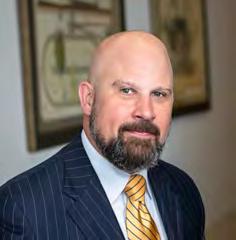

Michael “Mic” Davis ’23 always knew he was bound for law school. But his path to a juris doctorate was not always a straight line. After graduating from the University of South Carolina with a degree in political science, he had a few other things he wanted to do.
“I was part of a work exchange program for several months,” Davis said. “I taught surfing, lived in the jungle, and backpacked through Nicaragua before coming back to Austin.”
Davis soon began knocking on doors at the Capitol. He worked as a Senate messenger before serving as a legislative policy analyst at the Texas Juvenile Justice Department and for Texas Senator Brian Birdwell. “It was a great opportunity to work with key stakeholders and help pass meaningful legislation for the State of Texas,” he said.
Davis found himself at a crossroad when his father died at an early age from a heart attack. “I knew it was time to go to law school,” he said. “My father’s passing made me realize the clock was ticking, and I wanted to study law as soon as possible.”
He took the LSAT and applied to every law school in Texas. “When I visited South Texas College of Law Houston, I was impressed with all the trophies won by the advocacy teams,” he said. “My dad was a football coach, so I was raised to have a competitive nature. This really spoke to me, so I was all in!”
Davis focused on advocacy while attending South Texas. And his focus paid off. He was a 2022 American Bar Association (ABA) National Appellate Advocacy Competition Regional Champion. He also won the 2023 National Championship for the ABA Arbitration Competition and competed as a finalist in the State Moot Court Competition, where he argued before the members of the Supreme Court of Texas.
“I lived and breathed moot court and appellate advocacy,” he said. “Rob Galloway, the professor who leads the law school’s advocacy program, trusted me, and put me in position to win.”
Adjunct advocacy professor Hunter Barrow ’99 and advocacy coach Andrew Bender ’12, shareholders at Andrews Myers, P.C., recognized Davis’ commitment to developing his advocacy skills. When the Fourteenth Court of Appeals set one of their cases for oral argument, Barrow and Bender saw an opportunity to give their client an advantage while helping Davis gain real-world experience.
They suggested that Davis, who was already clerking at Andrews Myers, get a supervised practice card and argue the appeal. He jumped at the chance to put his training to the test, and they worked with him to prepare.
“We had witnessed first-hand the advocacy skills Mic learned in law school,” Bender said. “We were confident his preparation in the classroom would help him excel in the courtroom.”
Barrow affirmed that Davis performed well. “He grasped the concepts of the case and was very prepared. We had no doubt he could field any question posed by the panel,” he said.
Davis was preparing to argue before three Justices on the Fourteenth Court of Appeals, and he was up against an STCL Houston alumnus. “No pressure,” he said. He delivered his argument, finished the semester, and was studying for the bar exam when the opinion was issued. “The court ruled in favor of our client and reversed the trial court’s judgment.”
Many of the law school’s students, usually about 75 per semester, apply for and receive a supervised practice card. However, “it is unusual for a student to use that card to argue a case at the appellate level,” said Cathy Burnett, associate dean for experiential education, and professor of law at STCL Houston.
“It wouldn’t surprise me if Mic was the first law student in Texas to deliver an oral argument on behalf of a client in the court of appeals,” Bender said.
Barrow sees supervised practice as a win for everyone. “It benefits students who need experience to succeed,” he said. “It benefits law firms by helping create stronger lawyers who can provide better service to clients. And it’s a golden opportunity to pay it forward, as someone else has done for most attorneys at some point in their career.”
Davis passed the bar exam and is now an associate at Andrew Myers, P.C., specializing in construction and commercial law.
“It was a real confidence boost to help win an appeal as a law student,” he said. “I was able to help the client, and I am excited about what lies ahead.”
22 South Texas College of Law Houston
Mic Davis ’23
Hunter Barrow ’99
Andrew Bender ’12
Study Abroad Program in Prague Gives Students International Legal Perspective




This past summer, a group of 22 students traveled to Prague, Czech Republic, to participate in the first Study Abroad Program after pandemic lockdowns had put the international program on hold for three years.
The classes took place at the Faculty of Law at Charles University, the Czech Republic’s premier law school, which was founded in 1348. Students earned academic credit and gained global perspectives while engaging in activities inside and outside the classroom.
South Texas professors Katerina Lewinbuk, Cherie Taylor, and John Worley taught the students and led discussions, alongside some Czech colleagues from Charles University and members of the legal community in Prague. The program featured extracurricular group activities, including a visit to the High Court in Prague; a meeting at the Havel & Partners law firm; a trip to Terezin, a World War II concentration camp; and a boat tour along the Vltava River. Students also were able to travel to many cities in the Czech Republic and nearby countries over long weekends.
Lewinbuk, a naturalized U.S. citizen born in the Soviet Union, is now in charge of international programs at the law school. She has spent time in Prague as a professor and as a Fulbright Scholar. She is particularly fond of the city.
“I enjoy sharing its beauty and history with students and colleagues,” she said. “I am also eager to help give law students a broader perspective. The study of international and comparative law not only allows the students to learn about other legal systems
and cultures, but it also makes them realize the unique role of the attorney in America.”
Andres Suarez, now a 3L student, returned to Houston with that idea top of mind. “It was eye opening just seeing how other legal systems operate,” he said. “It gives you real perspective into how other places carry out their laws and makes you very grateful for the U.S. legal system.”
Students who were part of the trip were pleased with the experience and felt they benefited in many ways. They felt enriched personally and better positioned professionally.
“If you don’t challenge yourself, you’re not going to grow,” said Margaret Matheny, currently a 3L student at STCL Houston. “Studying abroad is a perfect way to challenge yourself — to live within a new culture and expose yourself to things you would not see in everyday life. I think if anything, it adds to your personal growth and adds to your resume in a way that working 9-to-5 wouldn’t.”
Sirish Yerrapragada, one of the 2023 participants and a 3L, was so enthusiastic about the study abroad experience that he organized a small group of fellow students to make a video in support of the school’s marketing efforts for the upcoming 2024 Prague session.
“When you have the chance to live and study and work in another country — to get the chance to feel like you’re becoming a part of the legal community — it’s a really, really wonderful thing,” he said.
stcl.edu 23
IN BRIEF
Three New Board Members to Serve Houston’s Oldest Law School
This past year, South Texas College of Law Houston elected three distinguished individuals to its board of directors. The new board members bring a wealth of experience, expertise, and a shared commitment to the advancement of legal education and the pursuit of justice.
“We were delighted to welcome Regina Bynote Jones, Mitchell Avila Katine, and Sharon Schweitzer to the board,” said Genora K. Boykins ’85, chair of the law school’s board of directors. “Their deep commitment to our mission and exceptional achievements make them outstanding additions. Their insights will be valuable as we navigate the evolving landscape of legal education and move into STCL Houston’s second century.”
A highly respected global business leader and attorney, Jones has an illustrious career spanning more than two decades. She has held global roles in complex legal environments including assignments in Europe, Southeast Asia, and across the United States. With her deep understanding of complex legal environments, Jones brings invaluable insights to the board.
As a prominent advocate for social justice and equality, Katine has dedicated his career to addressing systemic issues and promoting positive change for the rights of the LGBTQ+ community within the legal system. He brings expertise in civil rights law and a commitment to inclusivity. He is a founding partner of Katine Nechman McLaurin LLP.
An internationally recognized crosscultural business expert, bestselling author, and entrepreneur, Sharon Schweitzer brings more than 20
years of leadership training and a unique perspective to the board.
Schweitzer has a successful career in the business world, and she has given back to STCL Houston as a guest speaker on key topics that help law students succeed after graduation. Schweitzer has expertise in domestic and global cultural differences and fosters an appreciation of diversity.
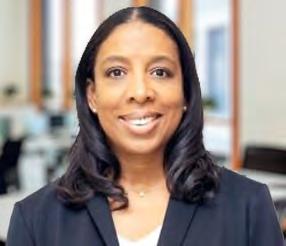


Professional Accomplishments
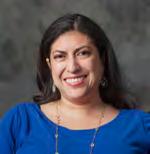
Aimee Maldonado ’04, Adjunct Professor and Public Interest Attorney, Randall O. Sorrels Legal Clinics, made numerous presentations in 2023 that delivered continuing education credits, such as: “Continuing Education for Social Workers at Texas Children’s Hospital: Public Charge and Immigration Updates”; AILA Texas New Mexico Oklahoma Chapter Spring Conference, Immigration Clinic Professor Panel; “Public Charge and Family Matters Affecting Citizenship and Removal” at Intersection of Immigration and Family Law hosted by the Family Law and Immigration Sections of the State Bar; “Practicing with Disabilities and Diversity” Austin Bar Association DEI Summit; NITA/ Immigration Faculty for Trial Skills Training, ABA’s Children Immigration Law Academy. She co-presented “DEI and Wellness: Creating a Culture that Fosters Both” with Dustin O’Quinn from Lane Powell PC at the AILA Texas New Mexico Oklahoma Chapter Fall Conference in Costa Rica.
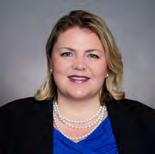
Adjunct Prof. Ruby Powers was chosen as one of Houston’s 50 Most Influential Women of 2023. She participated in numerous American Immigration Lawyers Association (AILA) conferences across the country, and has published a book with AILA titled Build and Manage Your Successful Immigration Law Firm (Without Losing Your Mind). Her media appearances include an online interview with Ideastream, and broadcast interviews with CBBA Radio, NTVAmerica, Morning Rush, and CBC Toronto.
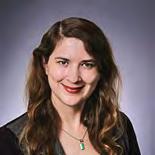
Cara Shaffer, director of the Legal Writing Center, was an invited speaker at the Houston Young Lawyer Association’s Summer Associate Symposium. Shaffer’s article, “Context at the Periphery: The Rise of the Critical-Contextual Legal Education Reform Movement”, will be published in the spring edition of the C ardozo Journal of Equal r ights and so Cial JustiCE.
24 South Texas College of Law Houston
Regina Bynote Jones ’98
Mitchell Avila Katine ’85
Sharon M. Schweitzer ’89
Centennial Symposia Feature Panelists, Guest Speakers Focused on Energy and Ethics, International Finance and Arbitration
The South Texas Law Review hosted its 29th Annual Ethics Symposium on campus March 3. For the first time, the event focused on the intersection of renewable energy and ethics.
“South Texas has frequently been at the forefront of energy law, and we continue to lead the way with this discussion of ethics and renewables,” said Zach Troell, editor-in-chief of the South Texas Law Review at the time. “During the Centennial year, we wanted to put our focus on a new area.”
Presentations and panel discussions included an update on the Texas power grid from ERCOT’s General Counsel Chad V. Seely ’02, a frank discussion on the ethical considerations in developing areas of renewable energy, and a conversation among energy executives about the challenges presented in the renewable energy sector.
Presenters included Regina Bynote Jones ’98, ADM senior vice president, general counsel, and secretary; Gabe Lerner ’10, managing director of Allied Orion Group; and Matthew Skalka ’10,

vice president and head of Stewart Title’s National Commercial Services Office, where he leads Stewart Title’s Energy Group.
In October, STCL Houston hosted the “Crossroads of International Arbitration, Finance, and Investment” symposium on campus. South Texas Adjunct Professor Denise Peterson ’10 gave the luncheon keynote at the event, which was presented by CurrEnts: Journal of intErnational EConomiC l aw
Professor Ryan Nelson Appointed to Board of National LGBTQ+ Bar Association
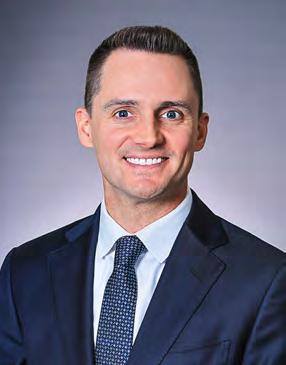
STCL Houston Assistant Professor Ryan H. Nelson was recently appointed to the Board of Directors for the National LGBTQ+ Bar Association. He is the only tenure-track law professor nationwide serving on this prestigious board.
“It’s a privilege to serve the LGBTQ+ community at this crucial time when we are fighting for our basic human dignity here in Texas and beyond,” Nelson said. “Pride began not as a celebration, but as a political and cultural uprising where queer people and their allies demanded equality.

Peterson discussed the importance of attorneys being both zealous advocates for clients and counselors at law — ensuring clients know about all options available to them to reach their goals. She spoke about the growing demand for and importance of mediation and dispute resolution as time-to-trial has doubled since COVID.
Panelists included experts from major local law firms, the World Bank, and Financial Industry Regulatory Authority (FINRA).

More
Law
stcl.edu 25
Contact Student Support at 713-646-2975.
than 100 South Texas
students picked up professional attire at no cost during the annual fall Law Suits event. The volunteer coordinators accept donations year-round.
Presentation on renewable energy and ethics
Denise Peterson ’10
IN BRIEF
Three Named to 2023 AALS Pro Bono Honor Roll
South Texas College of Law Houston nominated three individuals to the 2023 American Association of Law Schools’ (AALS) Pro Bono Service Honor Roll, which celebrates the exceptional work of individuals engaging in, expanding, and/ or supporting their law school community in providing pro bono legal services.
“The law school’s commitment to pro bono service is significant and longstanding,” said Catherine Greene Burnett, vice president, associate dean for experiential learning, professor of law, and director of the Pro Bono Honors Program.
The annual honor roll is hosted by the AALS’s Pro Bono and Access to Justice Section. The individuals recognized by South Texas Law for 2023 were:
Professor James “Jim” Musselman has contributed between 50 and 100 hours per year to the Community Christian Legal Aid Clinic for the last five years — meeting with clients, representing some of them on a pro bono basis, and meeting with the clinic’s administrator. He and his wife Martha ’00, also an attorney, have helped clients by coaching them and helping them win in small claims cases. The Musselmans have assisted clients with other needs along the way. The clinic administrator said, “They are truly the backbone of our legal aid organization, and we are incredibly grateful for them.”
Rebecca Garcia, who will earn her J.D. in May 2024, has made a significant impact by helping underserved families work through the guardianship process. She offers substantial legal pro bono service under the supervision of a licensed attorney, and is involved in public service-oriented student law groups. One former client in the Guardianship Clinic shared this note after Garcia’s successful effort to help the mom secure


guardianship of her daughter with special needs. “Rebecca is a perfect candidate for an award about dedication to clients. She was helpful, kind, and patient with me and my daughter as we worked through the guardianship process.” Garcia also was commended by the Supreme Court of Texas and the Texas Access to Justice Commission for her outstanding contributions to the provision of legal services to the poor.
Vinh Ho, senior director of legal services for STCL Houston’s Randall O. Sorrels Legal Clinics, co-teaches clinical courses: medical-legal partnership, opioid use disorder, immigration, and asylum/human trafficking. Previously, as executive director and legal services manager of BPSOS-Houston and as a pro bono-turned-staff attorney at YMCA International Services, he represented domestic violence and human trafficking survivors and asylum seekers, and assisted clients with immigration petitions and family law matters. Ho received a JD/MBA from Texas Tech School of Law. He has served on the Texas Bar’s Committees on Legal Services to the Poor in Civil Matters and Laws Relating to Immigration and Nationality. He has launched or helped found numerous community initiatives focused on legal services.
To celebrate the law school’s 100th anniversary in 2023, the Student Bar Association (SBA) aimed to raise $23,000 for ABC13 Houston’s annual Share Your Holidays Food Drive, benefiting the Houston Food Bank.
They surpassed the goal, presenting a check for more than $24,700. For the last 12 years, South Texas has been the largest academic donor to this food drive.
South Texas SBA Vice President Sarah Zepeda, a 3L, presented the donation during a televised, live event in November.
26 South Texas College of Law Houston
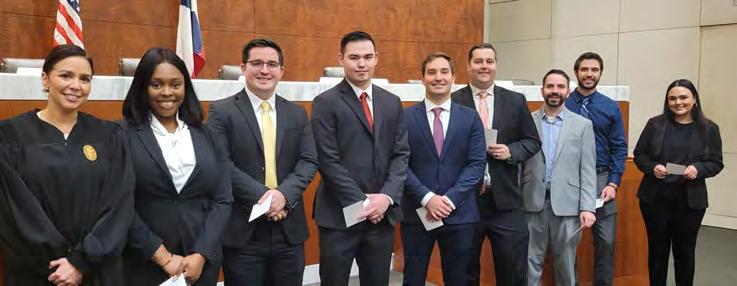
LAW IN THE FAMILY:
Three Siblings from Dallas
Concurrently Attending STCL Houston
Three LaRoe siblings from Dallas currently are attending South Texas College of Law Houston, and they are set to graduate in May of 2024, 2025, and 2026.
Though their parents are attorneys, James LaRoe IV, Jagger LaRoe and his twin sister Savannah LaRoe (seven minutes younger!) knew they could follow their own paths. Turns out, they all wanted to be litigators — and they felt confident South Texas was the place to prepare them.
“I told them to come here after my first year because of the rich heritage of the advocacy program and the connections you make here,” said James, a thirdyear law student. “We joked that we’ll become the litigating LaRoes.” Their dad James LaRoe III works in subrogation law and their mom Nicolette LaRoe does guardian ad litem work.
The siblings, while independent and uniquely talented, have much in common as well. For example, all were successful multi-sport athletes since childhood.
“Mom and Dad attended every game, every recital… every activity… and they coached every sport we played when
South Texas College of Law Houston hosted a Bench and Bar reception and swearing-in ceremony Nov. 1 to welcome recent graduates to the Texas Bar and honor graduates who serve the community as members of the judiciary. The recently credentialed attorneys were sworn in by the Hon. Erika Ramirez ’15, judge for Harris County Criminal Court No. 8.
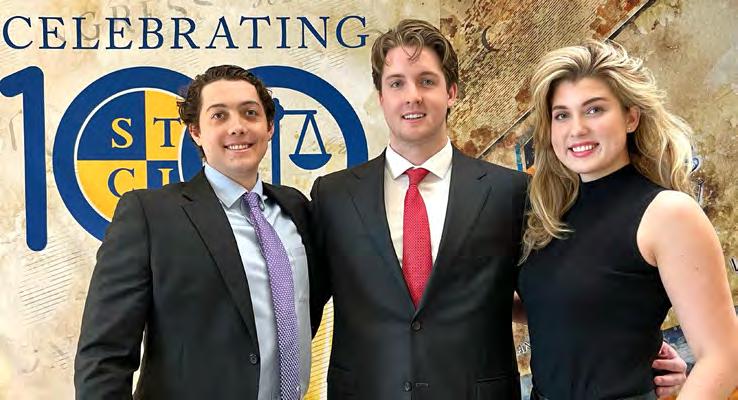
we were young,” Savannah said. “They taught us that hard work is the only way to succeed; they taught us time management tools and study skills; and they encouraged us to push beyond our comfort zone.”
Through their family, the law students learned the value of teamwork, determination, and being an integral part of the community. Growing up, they spent a lot of time with their older sister, Sydney LaRoe, who has special needs.
“We learned to show compassion to one another — though we still have normal sibling fights,” Savannah said. Jagger said that closeness with his brother and sister is essential to his success. “We just support each other here, and we push each other to be better. We talk each other through things because law school is hard.”
Jagger said of James and Savannah, “These are my biggest opponents… since we were younger. I wouldn’t have been able to get as far as I did without them pushing me. Not only here but in our lives.”
James has competed in the Mock Trial Program for a year now. “It’s going very well; the skills you learn are immense,” he said. “The more competitions you have, the more reps you have, the more dangerous you are — meaning, when you go into a career, you can bring more to the table. You’ll be ready to advocate — to effect change in our community.”
Savannah stated her long-term professional goal directly, “We want to try cases to win.” “But,” James noted, “we know we are in the learning process.” Jagger added, “I feel like we’ve been preparing to become lawyers our whole lives.”
stcl.edu 27
IN BRIEF
South
Texas Law Celebrates More than 300 Graduates in May, December 2023

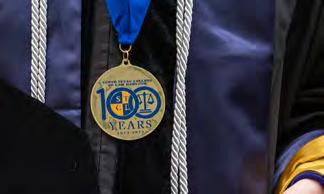

South Texas College of Law Houston conferred Doctor of Jurisprudence (J.D.) degrees to more than 240 graduates May 13 and 56 on Dec. 9, honoring them for their hard work, outstanding academic achievement, and perseverance through many challenges — including COVID.
“Congratulations on a job very well done,” said President and Dean Michael F. Barry. “As graduates in 2023, you have the special distinction of completing your J.D. during our Centennial year. I am sure our founders would be proud of your commitment and dedication.”
Spring Commencement speaker Nathan L. Hecht, Chief Justice of the Supreme Court of Texas, challenged the newly minted attorneys to foster innovations that will make the justice

system more accessible to Texas citizens. He also remided them of their role in preserving the rule of law, engaging in civil discourse, and maintaining our democracy using the art of persuasion.
“It’s your turn to take on the changes that will keep our justice system not only the best in the world, but the best in the history of the world,” Hecht said.
Taylor Leger ’23, valedictorian of the spring graduating class, encouraged her fellow graduates to share their moment of triumph with all the people in their lives who were supportive of them throughout their law school experience. Her address included wishes for success and personal growth – particularly when that growth is the result of conflicts and difficulties.
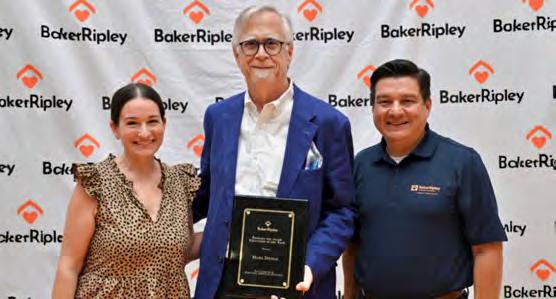
2023 Distinguished Alumni of the Year Benny Agosto, Jr. ’95 challenged and inspired graduates during the fall Commencement ceremony. He is a managing partner of Abraham, Watkins, Nichols, Agosto, Aziz & Stogner in Houston, the longest standing plaintiffs’ personal injury law firm in Texas.
Texas A&M graduate Joshua Fojtik ’23, the fall 2023 valedictorian, was the student speaker at the December event. “I have learned two major lessons in life,” Fojtik said. “One, hard work can overcome practically anything. And two, being honest, concise, and direct are the most useful methods in brief writing, oral arguments, negotiations — and nearly every situation.”
Dr. Mark E. Steiner, retired professor of law, was named the 2023 Barbara Day Volunteer of the Year by Houston nonprofit BakerRipley. For more than 15 years, Steiner has supported the legal needs of the city’s underserved communities. As a volunteer attorney, he has spent hundreds of hours consulting and advising immigrants as they begin their journey to naturalization through the BakerRipley Immigration and Citizenship program.
28 South Texas College of Law Houston
Don Jordan Retires from Board of South Texas College Of Law Houston After More Than Three Decades of Extraordinary Leadership and Service
Don D. Jordan ’69 — energy executive, civic leader, and highly respected family man — has served South Texas College of Law Houston and its board of directors with unfailing devotion and leadership for more than three decades — from December 1991 to December 2023.
Jordan was elected to the board’s executive committee in 2000 and was the board chair from 2003 to 2008. Through the years, he demonstrated philanthropic leadership and spearheaded efforts to increase the effectiveness of the board.
“Don Jordan has provided extraordinary leadership and service for more than 30 years on the law school’s board,” said Michael F. Barry, South Texas Law president and dean. “His commitment to the law school has been unfailing, and he has tirelessly given of his time, wisdom, and counsel to the board and
administration — directly and positively impacting past and future students, faculty, and staff.”
A resolution unanimously adopted by the law school’s board of directors commended Jordan for “his dedication to the mission, success, and achievement of South Texas College of Law Houston.” The board also extended its heartfelt thanks for his service and commitment and congratulated him on his retirement.
Jordan is the retired chairman and CEO of Reliant Energy. He served on many corporate and nonprofit boards through the years and was extremely active as a civic leader, including as chair of the Houston Livestock Show and Rodeo. His significant honors include being named South Texas Law’s Distinguished Alumni of the Year in 1980.
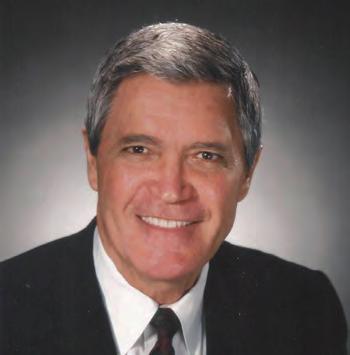
A Corpus Christi native, Jordan received a bachelor’s degree in industrial management from the University of Texas and a law degree from South Texas College of Law in 1969. He is married to Barbara Jordan and has three daughters: Leslie Hazelwood, Lisa Cunningham, and Laura McNear.
Duplicate Journals Donated to Help Students in Uganda
The Fred Parks Law Library at South Texas College of Law Houston is a proud participant in the Uganda Donation Project. Created this year by Michele Pope, a librarian at the Loyola University New Orleans Law Library, this initiative is collecting no-longer needed law journals and other print materials from American law school libraries and sending them to five Ugandan universities with law programs.
“The donated items will go directly to university libraries to support law school curriculums and research,” Pope said. This project will serve approximately 3,750 students in undergraduate and graduate legal studies.
“Removing volumes that are no longer used in print and widely accessible to our community online not only helps
students in Uganda have access to needed information, but it also gives us the ability to acquire new material or create new types of space in the Law Library,” said Colleen Manning, senior director of The Fred Parks Law Library and assistant professor of law.
Monica Ortale ’93, associate director for public services for The Fred Parks Law Library, was eager to participate in the program when she first learned of it. With permission from Manning, she and colleague Barbara Szalkowski, core operations librarian, worked together to make the donation a reality.
“I reached out to Loyola’s Michele Pope to better understand the needs of the Ugandan schools,” said Ortale. “Barbara then determined what titles could be donated. She also updated the
catalogue and provided a digital link to the titles that can now be easily found on HeinOnline,” she said.
The task of pulling the journals and boxing them up was undertaken by Ortale herself. “We donated 18 titles, comprising 542 volumes total.”
The boxes of books contributed by The Fred Parks Law Library were shipped off to Loyola New Orleans and added to the donations from other law school libraries. “The Uganda Law Donation project will give discarded volumes a second life while providing support for law school programs with limited online or print resources,” said Pope. The shipping container is scheduled to leave for Uganda in May 2024.
stcl.edu 29

Dear South Texas Alumni:
What a fabulous year this has been! We have celebrated the law school’s 100th anniversary by honoring the past, celebrating the present, and building the future. We have come together for exciting events, connected with old alumni friends, and made some new ones.
From the extraordinary Founder’s Day in April to the Reunion Week culminating in the sold-out Centennial Gala and the South Texas Family Picnic, the law school drew together alumni, students, faculty, staff, and the broader community to celebrate a century of excellence in legal education – and to celebrate our 16,000-strong enduring alumni network that reaches across the country and makes a serious impact on the legal profession.
We highlighted three special graduates at the Alumni Association Awards Luncheon this fall. Their stories and photos are shared in this alumni section of InRe.
Centennial stories have helped us see our law school alma mater with fresh eyes. We learned more about the law school’s founders — leaders in Houston’s legal and business circles in 1923 who saw the need for a law school offering evening classes that would allow working professionals to gain a quality law degree.
This year, our goal was to leverage STCL Houston’s Centennial year to elevate the visibility and reputation of the law school. With your support, that vision became a reality. As president of the Alumni Association, I want to send a sincere thank-you to all who helped make our Centennial year memorable.
This past year, our alumni earned big wins. Started new firms. Became judges. Received promotions. Fought for justice. And served the community through pro bono work and through leadership on the boards of many nonprofits.
More than ever before, we all realized that South Texas alumni are EVERYWHERE — impacting people’s lives and the communities in which they live. I hope you find time to return to campus soon. It’s still a very special place, and your support through your time and your gifts makes a world of difference.
Now, on to our second century!
30 South Texas College of Law Houston
REUNION WEEK 2023
Centennial Alumni Awards Luncheon Celebrates Three Outstanding Attorneys, Toasts a Century of Excellence in Legal Education
The South Texas College of Law Houston Alumni Association honored three South Texas alumni September 21 at The Hobby Center during the Centennial Alumni Awards Luncheon: Benny Agosto, Jr. ’95, Distinguished Alumni Award; Samantha Torres ’13, Young Alumni Award; and Jose S. Lopez ’03, Public Service Award.
The annual event serves as an opportunity to acknowledge and celebrate the achievements of exceptional South Texas alumni.
In her welcome, Jennifer O’Brien Stogner ’06, president of the Alumni Association Board of Directors, praised her fellow alumni in the audience, saying, “We are a diverse, successful, and impressive group.”
Stogner shared that the Alumni Association has given a total of 77 awards since 1967. Many past honorees joined the three from this year for the special celebration held during the law school’s 100th anniversary year.
At the luncheon, STCL Houston President and Dean Michael F. Barry said, “It is an honor to be part of a law school that so ably prepares its graduates for success in the legal profession. There are 16,000 South Texas alumni serving our city, our state, and our country. Thank you for your commitment to the legal profession, your dedication to justice, and your support for the mission of South Texas College of Law Houston.”
Benny Agosto, Jr. ’95 Named STCL Houston Alumni Association’s 2023 Distinguished Alumnus
Benny Agosto, Jr., who received the highest award given by the Alumni Association, noted, “It is a great honor that I am here standing before you. I am a blessed man, here by the grace of God. Thank you to South Texas for this special recognition and thank you to all those distinguished people who came before me.”
Agosto is managing partner with Abraham, Watkins, Nichols, Agosto, Aziz & Stogner, one of the longest standing plaintiffs’ personal injury law firms in Texas. The distinguished alumnus shared three messages: be grateful, be inspired and inspire others, and keep setting new goals.
He concluded with a Centennial celebration moment as guests raised their glasses of champagne: “I toast South Texas for 100 years of success — and for success in the next 100!”
An initial gift of $3 million from Benny Agosto and his wife Nichole in 2021
allowed STCL Houston to launch the Benny Agosto, Jr. Diversity Center. He has focused much of his career on helping change the face of law to become more diverse.
He earned his bachelor’s degree from Houston Baptist University (now Houston Christian University).
Agosto served as Houston Bar Association (HBA) president in 2019-20 and was the first native Spanish speaker and second Latino to serve as president of the HBA. As the Hispanic National Bar Association (HNBA) president from 201112, Agosto brought many important issues to the forefront of the national debate. He is president and a cofounder of the HNBA’s Legal Education Fund — the association’s only 501(c)3 charitable group that raises money to give 100 percent of its contributions toward minority scholarships — and he founded the Mexican American Bar Association of Texas Foundation. He has earned significant recognition on local
and national levels and he is a former recipient of the President’s Award from both the State Bar of Texas and the HBA and the Outstanding Public Service Award from STCL Houston.

stcl.edu 31 STCL HOUSTON
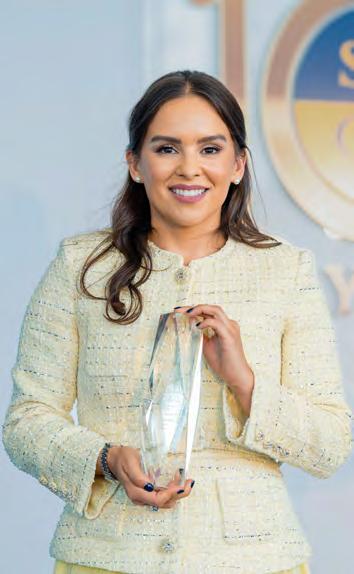
Samantha Torres ’13
2023 Young Alumni Award Recipient
Samantha Torres, a litigator, shared in her remarks that mental health in the legal profession is an important priority for her. She has been involved in developing events for the Houston Bar Association that emphasize mental wellness.
She attributes much of her success and the development of her network to South Texas College of Law Houston and to bar service.
“I continue to get more connected with my law school alma mater as the years wear on,” she said. “I am honored to be here with all of you. This award today is unexpected — and even better than I imagined.”
Torres, a first-generation attorney and graduate of the University of Texas at

José S. Lopez ’03
Austin, is a litigation associate at Okin Adams Bartlett Curry LLP, a bankruptcy and restructuring, general litigation, and corporate transactions firm. Before entering private practice, Torres gained extensive first-chair jury trial experience as an attorney for the State of Texas at the Special Prosecution Unit in Huntsville.
She serves as vice chair of the Programs & Events Committee on the STCL Houston Alumni Association Board. In 2022, the committee organized a CLE featuring prominent STCL Houston alumnae. Torres is a director on the Houston Bar Association Board, the cochair of the Houston Bar Association’s Membership Committee, and a director on the Houston Lawyer Referral Service Board. In 2019-20, she served as President of Houston Young Lawyers Association.
2023 Public Service Award Recipient
José S. Lopez was recognized for his unwavering commitment to public service and his substantial contributions to the betterment of society.
He noted that South Texas College of Law Houston provides a platform and resources for alumni to stay connected.
“I cannot do this alone,” he said, as he described his professional and service activities. He noted several nonprofits that are important to him, including Big Brothers Big Sisters, Connect Community, and Rotary International.
“South Texas shaped my law career and helped me form lifelong friendships,” Lopez said. “Here’s to the next 100 years!”
Lopez is a proud immigrant and the owner of The Lopez Law Firm. His practice focuses on helping people who have suffered serious injuries in an accident. He represents thousands of clients and has recovered millions for them. He earned his bachelor’s degree from the University of Houston.
Lopez has been recognized by the Houston Mayor’s Office and the City of Houston for his community service. From food drives for needy families to laptop giveaways to students, he is visible and active in serving Greater Houston.
32 South Texas College of Law Houston

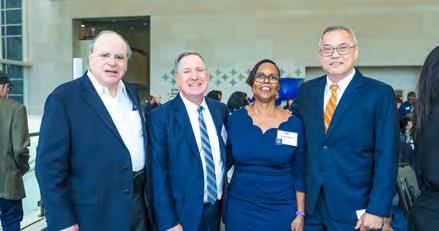


ALUMNI LUNCHEON



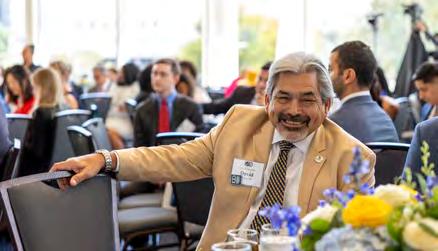


1 2 3 4 5 6 7
1. Lauren Rouhana ’14, Stephanie Diaz ’21, J.J. Slater ‘04
2. Baker Howry ’22, Mandi Capozzelli ’22, Meredith Spillane ‘22
3. Danny Perkins, Catina Haynes Perry ‘06,Goodwille Pierre ‘00
4. Christine Heron ‘10, Kami D’Olive ‘10 and Eric D’Olive ‘11
5. The Hon. David Medina ‘89
6. John Nechman ‘95, Denise Peterson ‘10, Brittny Mandarino Curry ‘20, Associate Dean Cathy Burnett, Mitchell Avila Katine ‘85
7. Prof. Maxine Goodman, the Hon. Theresa Chang ‘96, Prof. Sharon Finegan
Past Alumni Association award winners gather to celebrate at the Centennial Alumni Luncheon in September
Centennial Events Raise Profile, Draw Law School and Larger Community Together in 2023
Centennial events attracted thousands of people throughout the year. In May, South Texas College of Law Houston hosted its annual Alumni Association Crawfish Boil in honor of new graduates. Everyone enjoyed themselves at “the original” Ragin Cajun (see photos, p. 37).
During Reunion Week in September, some 600 alumni, faculty, staff, and supporters celebrated Sept. 23 at the soldout Centennial Gala with great food, a successful “paddles up,” and dancing to Rock and Roll Hall of Fame inductee the Spinners (see photos, pp. 34-36). The Gala was timed to coincide with the 100th anniversary of Sept. 24, 1923 — the official day classes began at South Texas 100 years ago.
Abraham, Watkins, Nichols, Agosto, Aziz & Stogner was presenting sponsor for the gala. Two couples with strong ties to
the law school — Karen and Roland Garcia ’86, and Jen and Brant Stogner, both class of ’06 — chaired the event. Roland Garcia is a shareholder at Greenberg Traurig, LLP. Brant Stogner is a partner at Abraham Watkins, and Jen Stogner is Of Counsel at Abraham Watkins and president of the STCL Houston Alumni Association Board of Directors.
Gala guests filled the lower and upper stories of the classic Corinthian. The special evening included a champagne toast to STCL Houston’s first 100 years — and to the next 100 years as well!
To conclude Reunion Week on the actual anniversary date of Sept. 24, alumni and friends as well as South Texas Law faculty, staff, and families gathered at Evelyn’s Park Conservancy in Bellaire for the South Texas Family Picnic (see photos, p. 37).


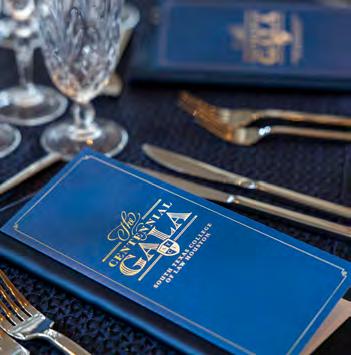

34 South Texas College of Law Houston
CENTENNIAL GALA
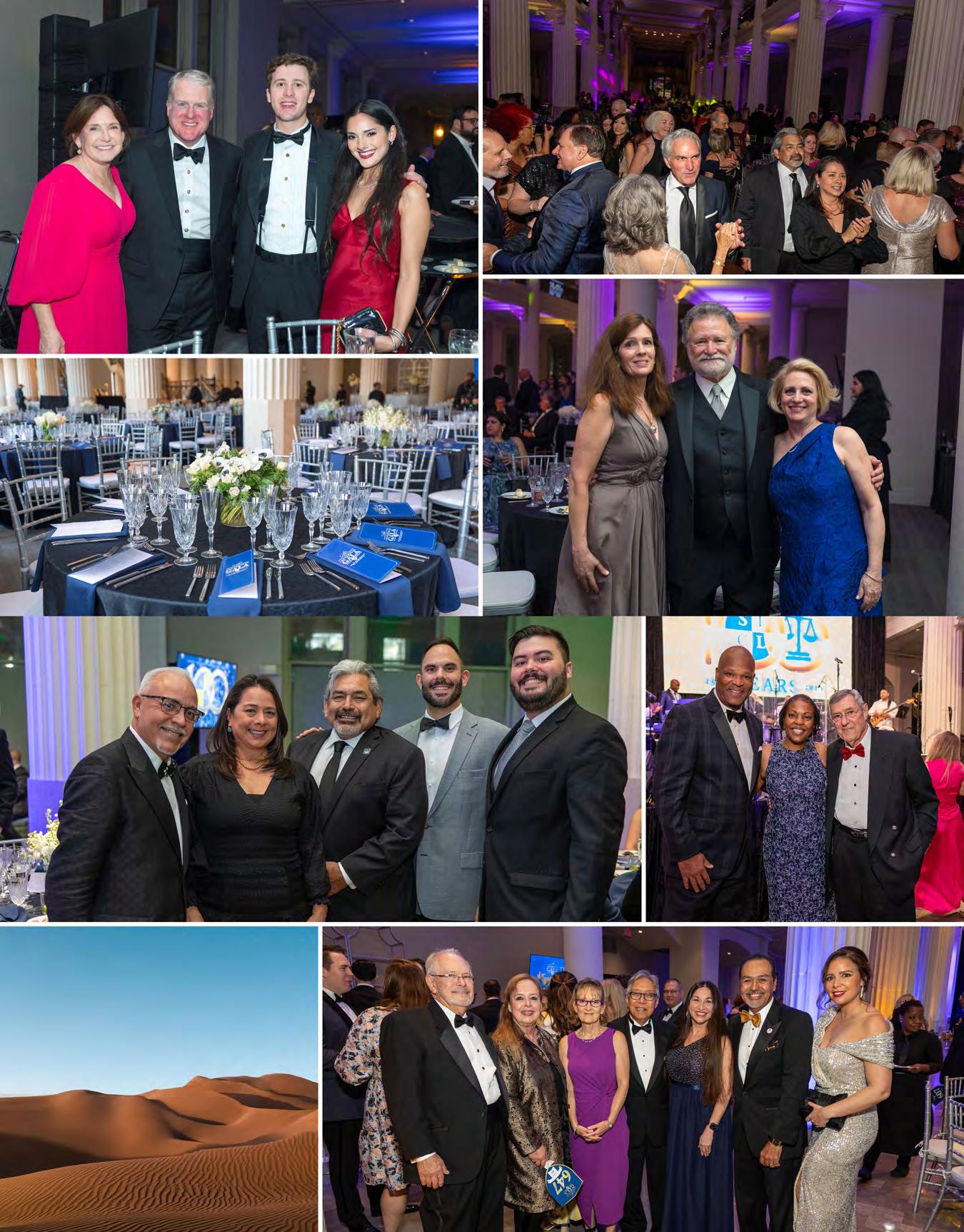 1. Julie Donaldson, Michael Donaldson ‘87, Morgan Cuenod, Adie Schlenker
2. Debbie Boniuk ‘89, Judge Bob Schaffer ‘85, Jo Ann Schaffer ‘85
3. Benny Agosto, Jr. ‘95, Judge Pamela Medina, Justice David Medina ‘89, Ben Agosto III ‘18, Jon Agosto ‘21
4. Dwight Boykins, Board Chair Genora Boykins ‘85, Joe Lopez ‘78
1. Julie Donaldson, Michael Donaldson ‘87, Morgan Cuenod, Adie Schlenker
2. Debbie Boniuk ‘89, Judge Bob Schaffer ‘85, Jo Ann Schaffer ‘85
3. Benny Agosto, Jr. ‘95, Judge Pamela Medina, Justice David Medina ‘89, Ben Agosto III ‘18, Jon Agosto ‘21
4. Dwight Boykins, Board Chair Genora Boykins ‘85, Joe Lopez ‘78
1 2 3 4 5
5. Hon. Jay Burnett ‘73, Dean Cathy Burnett, Judith Snively ‘86, Gordon Quan ‘77, Patricia Limon de Rodriguez, Judge Raul Rodriguez ‘91, Judge Erika Ramirez ‘15

CENTENNIAL GALA

 1. Executive Vice President Emerita Helen Jenkins, Crystal Washington ‘14
2. Julia Howry, Prof. Shelby Moore, Baker Howry ‘22, Daniel Howry, Randy Howry ‘85
3. Brad Leigh ‘00, The Spinners
4. Board Chair Genora Boykins ‘85
5. Katie Chatterton ‘08, James Flodine ‘81, Lynne Liberto ‘81, Andy Torrant ‘06
1. Executive Vice President Emerita Helen Jenkins, Crystal Washington ‘14
2. Julia Howry, Prof. Shelby Moore, Baker Howry ‘22, Daniel Howry, Randy Howry ‘85
3. Brad Leigh ‘00, The Spinners
4. Board Chair Genora Boykins ‘85
5. Katie Chatterton ‘08, James Flodine ‘81, Lynne Liberto ‘81, Andy Torrant ‘06
1 2 3 4 5 6
6. Roland Garcia ‘86, Karen Garcia, Alumni Association President Jen Stogner ‘06, Brant Stogner ‘06







CRAWFISH BOIL

SOUTH TEXAS FAMILY PICNIC
 1. Itze Navarro Soliz ‘93, Maria Carmen Gonzalez
2. Judge Christine Weems ‘00, Will Farmer ‘18, Jen Stogner ‘06, Soroush Montazari ‘19
3. Wendy and Larry Morris ‘86
4. Julia Simonet ‘14, Lee Barry, Dominique HInson ‘14, Mike Barry
5. Melanie Cruthirds ‘21, David Cruthirds ‘90, Rosemary Cruthirds
6. Davion White ‘18, Brittny Mandarino Curry ‘20, Andrea Roth ‘14
7. Elsa and The Hon. E.J. Salcines, Jr. ‘63
8. Mary Lloyd ‘81 and family
9. Prof. Debra Berman and Prof. Scott Rempell with their daughter
10. Jeanna Maxwell ‘14 and family
11. Carolyn and Frank Robertson ‘71
12. Marie Garcia ‘16 and family
1. Itze Navarro Soliz ‘93, Maria Carmen Gonzalez
2. Judge Christine Weems ‘00, Will Farmer ‘18, Jen Stogner ‘06, Soroush Montazari ‘19
3. Wendy and Larry Morris ‘86
4. Julia Simonet ‘14, Lee Barry, Dominique HInson ‘14, Mike Barry
5. Melanie Cruthirds ‘21, David Cruthirds ‘90, Rosemary Cruthirds
6. Davion White ‘18, Brittny Mandarino Curry ‘20, Andrea Roth ‘14
7. Elsa and The Hon. E.J. Salcines, Jr. ‘63
8. Mary Lloyd ‘81 and family
9. Prof. Debra Berman and Prof. Scott Rempell with their daughter
10. Jeanna Maxwell ‘14 and family
11. Carolyn and Frank Robertson ‘71
12. Marie Garcia ‘16 and family
1 4 7 5 8 6 9 10 11 12 13 2 3
13. Shantal Formia and family
CLASS NOTES
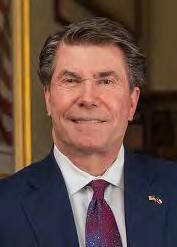
1980 - 1989
Steven C. Laird ’80, of Laird & McCloskey Partners, earned a spot in the 2023 Lawdragon 500 Leading Plaintiff Consumer Lawyers. Laird was also named to The Best Lawyers in America® Legal Guide, which highlights the nation’s top attorneys.
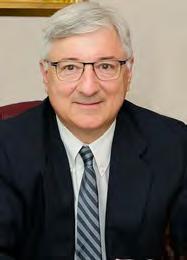
Lawrence J. Praeger ’81 was elected as a Fellow of the Texas Bar Foundation. Fellows of the Foundation are selected for their outstanding professional achievements and demonstrated commitment to improving the justice system throughout the state of Texas.
Hon. Ronald N. Ficarrotta ’82, Chief Judge of the 13th Judicial Circuit Court in Tampa, received the 2023 Distinguished Judicial Service Award. The award honors outstanding and sustained service to the public, especially regarding support of pro bono legal services. Judge Ficarrotta has long helmed the circuitwide tradition of pro bono service and community work and has been a steadfast supporter of the Volunteer Lawyers Program of Bay Area Legal Services.
Neil C. McCabe ’82 received a rating of “Notable” from Martindale/Hubbell from 2016-2023; American Registry’s Most Honored Lawyers Award 2020-2022; America’s Top 100 Personal Injury Attorneys Award 2021-2022; and Avvo Top-Rated Lawyer Award 2020-2022. He now lives in Paris and is writing a book using the impressive resources of La Bibliotheque Mazarine, France’s oldest public library.
Thomas O. Deen ’83 was recently elected president of the Corpus Christi International Seamen’s Center. This organization provides a “home away from home” for thousands of seafarers worldwide who visit and work in the Port of Corpus Christi each year.

Samuel R. Palermo ’83 has joined Sorrels Law as a member of their personal injury team, and their medical malpractice team.
William M. Pearson ’85, of Gunster Law Firm, announced a merger with Grant Fridkin Pearson, a Naples law firm with 27 years of practice in southwest Florida. The firm’s attorneys focus within four primary areas of practice: transactional real estate; business services; litigation and dispute resolution; and estate planning and trust and estate administration services. Grant Fridkin Pearson’s practices complement Gunster’s existing business and litigation services, and its culture and clientele align closely with those of Gunster.

Roland Garcia ’86 was appointed to the Hermann Eye Fund, a charitable fund of the Memorial Hermann Hospital System. He was also appointed to serve on the Senior Council of Memorial Hermann, comprised of former board members who advise the CEO and Senior Management of the system.
Linda Parrish ’86, a former Big Law partner with significant insurance defense experience, has joined the Sorrels Law team. “The addition of Linda Parrish could not bring me any more joy. Before taking time to start and raise a family, Linda was one of the most tenacious defense lawyers I ever faced. Now, we get to work side by side and our clients are lucky to have one of the most passionate, prepared and persuasive lawyers I know in their corner,” noted Randy Sorrels ’87.
Terry Adams ’87 was elected in November 2022 to serve as Chief Justice of the First Court of Appeals, Houston, Texas.
1990 - 1999
Barbara Porter (Martin) Fratila ’90 was elected Secretary of the Port Freeport Commission. She is the first female Commissioner, and was sworn in June 1, 2023, to a six-year term.
Fran Brochstein ’90 was elected President of the Texas Association of Mediators at their annual conference in March 2023.

Reid W. Martin ’91 (pictured) and John F. Walker ’92, co-founders of Martin Walker, were honored for the fifth consecutive year by Best Lawyers in America® for their work with plaintiffs in medical malpractice and other personal injury cases. The firm is also listed in the U.S. News & World Report Best Law Firms for 2023.
Deborah Henshaw Urbanski ’92 has retired from her position at NASA.
Mary-Olga Lovett ’93 has joined King & Spalding as a partner in their Trial and Global Disputes practice group. She is based in the firm’s Houston office.

Matthew L. Motes ’93, a partner at Shackelford, Bowen, McKinley & Norton, LLP, has been selected as one of the leading construction transactions and litigation lawyers in Fort Worth for 2022. He has been honored in the annual “Top Attorneys” edition of Fort Worth Magazine for representing general contractors, homebuilders, subcontractors, developers, suppliers, owners, and sureties in real estate and construction litigation for nearly 30 years. A former chair of the Tarrant County Bar Association’s Construction Law Section, he is a member of the National Association of Home Builders, Texas Association of Builders, and the Greater Fort Worth Builders Association. He also serves as president of the Rotary Club of Western Fort Worth.
38 South Texas College of Law Houston
Kay K. Egger ’93, owner of Collier Legal Search, spoke at a gathering of South Texas Law’s Presidential Fellows. This elite group is comprised of students in the top 15% of their class.
Veronica Jacobs ’94 recently received the 2023 Noble Lifetime Achievement Award in Poverty Law from Houston Volunteer Lawyers. The award honors a Texas attorney for a lifetime of public service in promoting poverty law as a noble profession and significant lifetime professional accomplishments in expanding the provision of high-quality legal services to people of modest means or protecting clients’ legal rights.

Leslie M. Henry ’95 has been appointed to the United States Golf Association’s (USGA) Executive Committee. The USGA, founded in 1894, advances the game of golf, and conducts many premier professional and amateur championships, including the U.S. Open and U.S. Women’s Open. Henry will serve a three-year term. This national appointment is another milestone to Henry’s contributions to the sport since she became interested in golf as a way to find equal footing in the legal industry. In 2020, Henry was the first female to be named president of the Texas Golf Association (TGA), following her appointment in 2016 as the first female to serve on the TGA’s Board of Directors.
Jarrett Coleman ’96 was named to Attorney Intel’s Top 25 Attorneys of Colorado for 2022. He is the General Counsel for the national homebuilder Century Communities, Inc.
Andrew J. Sarne ’96, director, Kane Russell Coleman Logan P.C., Houston office has been recognized in the 2024 edition of The Best Lawyers in America® for Litigation - Insurance.

Gary A. Scott ’96 was named as the city of Conroe’s administrator. Scott has served as assistant city attorney since 2001 before being appointed as city attorney in April 2021.
T. Jason Smith ’98 has joined Conga as Senior Principal, Strategy & Transformation.
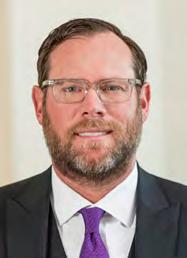
Michael P. Lyons ’99, co-founder of Lyons & Simmons, LLP, has been selected among D Magazine’s Best Lawyers in Dallas for 2023. This is the tenth appearance on this list for Lyons. Lyons was also named plaintiffs’ trailblazer in May by The National Law Journal. Lyons was also chosen for the 2024 edition of the Best Lawyers Legal Guide for successful representation of plaintiffs involved in personal injury litigation.
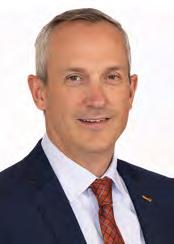
2000 - 2009
Robert A. Broadbent ’00, was recently named partner at Womble Bond Dickinson in the firm’s government contracts and cross-border trade practice in their Charlottesville and Tysons, Virginia offices.
Warford “Trace” Johnson ’00 was promoted to the position of associate general counsel and director of litigation and transactions for O’Reilly Auto Parts.
Manpreet K. Singh ’01 made history earlier this year as the first female Sikh judge elected in Harris County.
Jason C. Webster ’01 is a founding partner at the Webster Law Firm. The firm specializes in personal injury and mass tort litigation.
Michael G. Navarro ’03, director, Kane Russell Coleman Logan P.C.’s Houston office, has been recognized in the 2024 edition of The Best Lawyers in America® for Real Estate Law.
Bradford J. Gilde ’04, of Gilde Law Firm, recently obtained a $1.2 billion verdict alongside Bradley G. Ertl ‘19 from a jury of 12. The case involved a native Texan who was the victim of imaged-based sexual abuse – often incorrectly identified as “revenge porn.”
Catina H. Perry ’06 welcomed a new baby, daughter Sarah, this past year. Sarah joins big brother Beau, mom, and dad Lorin.
Ashley L. Harper ’08 was recently promoted to partner at Hunton Andrews Kurth LLP. Harper’s practice focuses on out-of-court and bankruptcy court financial restructurings and complex litigation that arises in bankruptcy cases and insolvency matters.
Anthony Robinson ’09 recently began his own firm specializing in criminal defense work. Robinson also serves as the Secretary for the Black Alumni Chapter of STCL Houston.

Michael W. Twomey ’09, director, Kane Russell Coleman Logan P.C.’s Houston office, has been recognized in the 2024 edition of The Best Lawyers in America® for Employment Law - Management and Litigation - Labor and Employment. Twomey represents businesses in employment and commercial matters, including matters involving data privacy and protection.
2010 - 2019
Logan R. Burke ’10, director, Kane Russell Coleman Logan P.C.’s Houston office, has been recognized in the 2024 edition of The Best Lawyers in America® for Commercial Litigation.
Ryan S. MacLeod ’10 joined Webster Vicknair MacLeod Law Firm as a partner. MacLeod, a highly experienced litigator, has successfully represented clients in various cases, including 18-wheeler cases, catastrophic injury claims, premises and product liability claims, and pharmaceutical litigation.
Teresa P. Messer ’12 is now serving as the Immigration Clinic Director and Professor of Practice at the University of Houston Law Center.
stcl.edu 39
CLASS NOTES

Ryan G. Revisore ’12 has been promoted to Shareholder at Munsch Hardt Kopf & Harr, P.C. Revisore is a member of the Firm’s Corporate & Securities and Health Care practices. He represents health care providers and facilities, as well as various other health care and nonhealth care organizations.
Wade B. Smith ’12 was named Harris County Criminal Defense Lawyer of the Year in 2023 by the Harris County Criminal Lawyers Association.

Derek C. Pershing ’13 has been elected Fellow of the Texas Bar Foundation. Fellows of the Foundation are selected for their outstanding professional achievements and demonstrated commitment to improving the justice system throughout Texas.
Jason B. Reiner ’13 was recently promoted to partner at Hunton Andrews Kurth LLP. He maintains a diverse practice involving all aspects of commercial real estate and finance transactions, including acquiring and developing office, retail, hotel, industrial projects, and various mixed-use developments.

William A. Moss ’14 was named senior counsel at Bracewell. Moss has experience in complex oil and gas litigation, as well as advising clients navigating the energy transition. In 2022, The Best Lawyers in America® named Moss as “One to Watch” in commercial litigation.

Carlton D. Wilde III ’14 was recently named Senior Counsel at Bracewell. He has first and secondchair experience representing plaintiffs and defendants in diverse complex business litigation and arbitration matters in the energy, construction, consumer products, real estate and healthcare industries. The Best Lawyers in America® has named him “One to Watch” in commercial litigation and intellectual property. Wilde also has been named a “Rising Star” by Texas Super Lawyers.
Crystal T. Dang ’15, senior associate with Peckar & Abramson-Houston, has been named to Engineering News-Record Texas & Louisiana’s 2023 Top Young Professionals list.
Jessie J. Ormand ’15 has joined Abraham, Watkins, Nichols, Agosto, Aziz & Stogner as an associate. Before joining Abraham Watkins, Ormand practiced personal injury law at another plaintiffs’ firm, where she gained valuable experience. She has successfully litigated numerous cases in both state and federal courts in Texas and was inducted into the Million Dollar Advocates Forum.
Cody Gomora ’16 joined the Dallas Office of Lewis Brisbois Bisgaard & Smith LLP in 2022, after serving as a prosecutor in Tarrant County. Gomora’s focus is on general liability cases involving complex commercial litigation, catastrophic injury, trucking collision defense, premises liability, and labor and employment issues in the public sector.
Maricela V. Alvarado ’17 has been promoted to partner at Monty & Ramirez. Alvarado started her career with the firm in May 2016 as a 2L. Since graduating from law school in December 2017, she has become an integral part of the Monty & Ramirez team, where her practice focuses on business-related immigration.
Nick R. O’Conner ’18, of McGlinchey Stafford, has been recognized in the 2024 edition of The Best Lawyers in America® and Best Lawyers: Ones to Watch in America.
Carissa L. Chow ’19 celebrates one year as associate counsel of Buc-ee’s, Ltd.
2020 - 2023
Khadiga Carr ’20 has joined Beasley Allen Law Firm as an associate. She is a lawyer in the firm’s toxic torts section, focusing on Paraquat and Camp Lejeune cases.
Ethan Q. Szumanski ’21 is the official Law Fellow for the Special Litigation Division of the Texas Attorney General’s Office.

Allison E. Knopp ’22 has been named an associate of St. Louis-based law firm Lewis Rice. Knopp practices in the litigation department, representing individuals and companies in complex commercial and civil litigation.
The Class Notes section relies on submissions from alumni. Please share your career and personal updates at my.stcl.edu for inclusion in the next issue of InRe.
40 South Texas College of Law Houston
Law School Equips Alumna for Policy, Advocacy Work in D.C.
“Iuse the research and analytical skills I learned at South Texas College of Law Houston almost every single day of my professional life,” said Jenny Kessler ’12, who serves as the director of Washington D.C. Mayor Muriel Bowser’s Office of Policy and Innovation (MOPI).
Licensed to practice law in Texas and Washington, D. C., Kessler does not litigate, prosecute, or defend. She does not practice corporate or transactional law. She is not a practitioner of alternate dispute resolution. She is a skilled critical thinker who can synthesize complex subject matters, and an effective communicator with an aptitude for mastering the legislative process.
Kessler joined Mayor Bowser’s administration in 2018 as an associate director in the Office of Federal and Regional Affairs, where she was the lead advocate for increased appropriations for key district-wide programs. She was also Bowser’s national service director, overseeing the team responsible for implementing and expanding national service throughout the District of Columbia.
Previously, she was the policy officer at the Low-Income Investment Fund, where she oversaw a national coalition of advocates fighting for access to quality early learning and K-12 education. Kessler also lobbied Congress on behalf of healthy food financing and funding for affordable housing.
In her current role, the native Texan manages a team of highly trained data scientists, researchers and other specialists charged with the
responsibility of finding innovative solutions to address everyday challenges that affect D.C. residents. “This is a completely original way of thinking and operating for municipalities,” Kessler said. “The concept of the Bloomberg Innovation Team is completely different from anything ever done.”
With a $2.6 million grant and technical support from Bloomberg Philanthropies, the “innovation team” focuses on designing new processes and methods to further improve public services and the digital experience for all the residents of the nation’s capital.
Kessler’s team is beginning with a project to improve the experience of small business owners during the building construction permitting process. Creating greater efficiencies, cutting bureaucracy, and deploying modern, online tools for end users could benefit a wide range of stakeholders, in addition to entrepreneurs. She feels she is in the right place, doing the work she was meant to do.
“I knew I wanted to focus on policy and advocacy work after completing an undergraduate internship in 2009 that gave me the opportunity to lobby the Texas Legislature,” Kessler said. “I realized all the lobbyists had law degrees, even though they didn’t use them in the traditional way. I knew I wanted to use my law degree to advocate.”
Kessler toured every law school in Texas before deciding on STCL Houston. “The professor – student ratio was great, and the services, programs, and supports

in place for students were important to me. I felt supported right away, as an admitted student.”
Fresh out of college with a degree in political science, Kessler says she thought she was prepared for law school. Her first semester proved her wrong. “It was such a different world, and it was incredibly challenging for me. Prof. Amanda Peters was my life saver. She was not only a great professor, but also a good person and a great listener. She showed me a lot of compassion and understanding. I was so honored she agreed to hood me at graduation.”
Looking back, Kessler fully appreciates that her time at STCL Houston demanded she learn to perfect the skills she uses so frequently: reading carefully, researching, writing opinions and analyses, developing a persuasive position, and managing projects. She also brings with her the law school’s well-known penchant for fresh, bold ideas. “We are trying to be a leader among local governments here in Washington D.C.,” she said. “We want to be at the forefront with innovative, progressive thinking about how to connect citizens to services.”
stcl.edu 41
Thank you, Philip, for your four decades of giving.

Because of the faculty’s belief in me and willingness to accept me, I have always been eternally grateful for the opportunity given to me. I knew I had it in me; apparently, other law schools didn’t, but South Texas did.

To
“ ”
PHILIP BOYKO ’77 General Counsel, Vice President SelecTransportation Resources,
LLC
42 South Texas College of Law Houston
the South Texas
go to my.stcl.edu/STF
contribute to
Fund,

For some veterans, the simple phrase “Thank you for your service!” and other opportunities to celebrate their time in the military forces may evoke mixed emotions, depending on their experience. That is especially so for veterans discharged from service with an incorrect or inappropriate status. The Veterans Clinic at South Texas College of Law Houston is helping military veterans remedy their discharge situation.
“This is where we shine,” said Diana Carlson, staff attorney at the Veterans Clinic, a part of the Randall O. Sorrels Legal Clinics at STCL Houston. “We mainly focus on discharge upgrade cases.”
When veterans receive anything other than an honorable discharge — which can occur for a variety of reasons — they are prevented from receiving benefits they would normally have earned through their military service.
Many veterans have received a discharge from military service that is other than honorable because they suffered from an undiagnosed mental health condition.
Veterans can appeal their discharge status, but it is complicated and timeconsuming. Carlson explained that legal assistance is critical for most discharge upgrade cases. Each branch of the military has its own regulations. Hours and hours of research are required, and complex legal briefs must be filed. In addition, hearings before a panel at the various discharge review boards are often necessary. Even then, the chance
of successfully upgrading a discharge is less than 20%.
Veteran-centered organizations assist veterans with access to their benefits. However, Carlson said, very few attorneys or groups help with discharge upgrades. “The process is complex and can take years,” she said. The law school’s Veterans Clinic is helping fill this gap.
A Success Story for One Army Veteran
Mark (not his real name) joined the U.S. Army in 1988. During the first phase of the Gulf War, Operation Desert Storm, he volunteered to serve on the front line. As a tank driver, he saw heavy combat and participated in many firefights.
After his noteworthy performance on the battlefield, Mark was finishing his enlistment stationed on an Army base. The daily sights and sounds of soldiers training for combat retraumatized him, and his undiagnosed PTSD led to a fight or flight response. Mark fled and was absent without leave (AWOL) for eight months. After realizing what he had done was not right, he turned himself in.
“Current procedures would have caught Mark’s PTSD well before he went AWOL,” Carlson said. Unfortunately, he was given a less than honorable discharge that led to a cascade of negative events in his life.
“He battled homelessness and drug addiction, and turned to prostitution to support his habit for more than 20 years. In 2019 Mark sobered up, and found us,” Carlson said. “The story he told us about
his service and his life after separation was heart wrenching. It was hard not to cry with him. He is a gentle person and was feeling very ashamed of the way he had been living.”
Carlson’s student team researched Mark’s case, and in June 2020, Carlson filed papers on his behalf. The average time to get a ruling is about two years, so during this time, Carlson battled the VA regarding his service-connected disability claim for PTSD.
In June 2022, Carlson learned the clinic was successful in getting Mark’s discharge upgraded to “General (under honorable conditions).” “Additionally, Mark’s record now reflects the two medals he earned: The Kuwait Liberation Medal and the Southwest Asia Service Medal with three Bronze Stars,” Carlson said.
A few months later, the clinic won his PTSD claim, with a status of 100% disabled. He is entitled to full disability benefits with back pay of $165,000 and a monthly stipend of almost $4,000.
Carlson noted that Mark, like most of her clients, was filled with gratitude –not just for the challenging work done on his behalf, but because he no longer felt dismissed and discarded.
“Any help we can give them is something we gladly do,” Carlson said. “These men and women have sacrificed their minds and their bodies for us. Whatever frustrations we encounter in the process as we try to set things straight is more than offset by the elation we feel when we get a positive outcome.”
stcl.edu 43
1950s – 1970s
Blanton Snodgrass ’50
Donald E. Hickey ’65
John R. Hall ’69
Charles R. Herbeck ’70
Rayburn P. Putney ’70
Norman J. Barfield ’73
Michael E. Shelton ’74
Eugene J. Miller ’75
Edward L. Noah ’75
David M. Feldman ’76
James T. Fletcher ’77
Joel M. Androphy ’78
F. D. Rees ’79


Betty Luke ’92
Retired Associate Professor
Betty Luke ’92 died April 3, 2023. She had retired from STCL Houston at the end of February after three decades of teaching students and tirelessly serving the community through the Randall O. Sorrels Legal Clinics.
“Betty’s commitment to clinical education and public interest lawyering was inspirational,” said President and Dean Michael F. Barry, in a note to the South Texas Law community.
“Some three decades of graduates formed critical aspects of their professional identity under her tutelage, and countless others benefited from the legal services she provided. Betty was an integral part of our culture and our South Texas family, and she will be sincerely missed.”
Luke started as a law student, then joined South Texas College of Law’s still-relatively
1980s – 1990s
Phillip C. Summers ’80
Richard L. Flowers ’82
James C. Good ’83
Lorrance B. Robertson ’83
Robert H. Cusack ’86
Harry R. Lawrence ’86
John W. Armstrong ’89
Harold L. Ross ’92
Andrew J. Loxsom ’93
new pro bono clinics as a staff attorney upon graduation. She served as a managing attorney, and then as a clinical professor. “Betty Luke touched the lives of countless students, clients, and colleagues,” Barry said.
Tracee Evans ’08, communications director at the Spring Fire Department, said, “Betty Luke crystalized the theories of law into the tools I would need to function as a lawyer. Her attention to detail was second only to her compassion for the people who turned to the clinic for help. She embodied everything that is right about the law, and I still use what she taught me today to do pro bono family law work for firefighters and others. I am sad that future generations of law students will not have her as a teacher and as a sounding board after they graduate. Betty Luke was a dedicated, compassionate legal mentor and teacher.”
44 South Texas College of Law Houston IN
MEMORIAM
my.stcl.edu/tribute
To make a tribute gift, please visit

Imogen “Immy” Papadopoulos ’84
Advisory Director, Board of Directors
Imogen “Immy” Sherman Papadopoulos ’84, an advisory director on South Texas College of Law Houston’s board of directors, passed away Nov. 15, 2023, at age 94. She devoted her life to helping families and children through her work as an attorney, counselor, and tireless advocate. President and Dean Michael F. Barry said, “Immy was one of a kind, and she will be missed.”
She began serving on the South Texas board in 2000 and was elected in 2003 as the first woman to serve on the board’s executive committee. Papadopoulos served on the board until December 2020, then became an advisory director.
While transferring around the U.S. for her husband Michael’s job with Shell Oil, Papadopoulos completed her master’s degree in counseling from Southern Illinois University and settled with her family in Houston in the early 1970s. Her volunteer focus on the welfare of youth and families led her to earn her J.D. from South Texas at age 55, with a focus on family law.

Ruthie Nelson White ’97
Executive Committee Member, Board of Directors
Ruthie White ’97, a South Texas College of Law Houston board member since 2016, passed away on Nov. 30, 2023. A Celebration of Life Service was held Dec. 15 at Covenant Glen Church in Rosharon.
Elected to the board’s executive committee, she became chair of the board effectiveness and nominating committee in 2021.
A partner at Spencer Fane in Houston, White was their labor and employment practice group leader. She helped employers resolve labor and employment disputes in and out of court. White’s broad in-house and outsidecounsel background gave her the ability to counsel clients on a wide range of labor and employment issues. She frequently presented employment law seminars for supervisors and managers geared to meet the overall business objectives of her clients.
As a practicing attorney for nearly 40 years, she specialized in representing children and families in crisis. She was a dedicated advocate, volunteering countless hours and traveling to Austin to help shape child protective policies. She served on numerous boards and committees and received many awards including the David Gibson Award for Professionalism and Excellence in Family Law, the Trailblazer for Youth Award from the Texas Network of Youth Services, and a Hometown Hero Award. She was a senior fellow of the American Leadership Forum, Houston.
A celebration of her life is planned in spring 2024. Her family encouraged those wishing to remember her to make a contribution in her name to South Texas College of Law Houston or the American Leadership Forum. She is survived by three sons, seven grandchildren, and nine great-grandchildren.
White had served as an adjunct professor at South Texas and was an active board member of several nonprofit organizations. She also founded The Downtown Group, a networking organization of African American female lawyers. White contributed pro bono legal services to the Houston Volunteer Lawyers Program, and was a frequent speaker at continuing legal education seminars for law schools and bar associations.
White earned her bachelor’s degree from the University of Texas at Austin and her MBA from the University of Houston. She will be greatly missed.
stcl.edu 45
Leader in Asian Legal Community, Former Houston Mayor Pro Tem Makes Planned Gift to Law School
Gordon Quan ’77, an immigration lawyer in Houston for 40 years, was born in Guangzhou, China, and raised between San Antonio and Houston. He developed a great love for Texas. He earned two bachelor’s degrees from the University of Texas, in history and government, and later earned his master’s degree in guidance and counseling from the University of Houston.
He served as a teacher in the Houston Independent School District while attending South Texas College of Law Houston as a part-time student, completing his juris doctorate in 1977. Throughout law school, he balanced his teaching job, evening classes, and a wife and baby. He spent all his free time studying, and he struggled to pay tuition along with his other bills.
When he became a licensed attorney, Quan says his life completely changed. He found a purpose and felt armed to help others. He has been assisting clients with complex and ordinary immigration issues for four decades, and his work has earned him many national accolades.
Through the years, Quan has demonstrated a deep compassion for the people of Houston and a strong belief in a future offering equal opportunity for success. He played a key role in the development of Bellaire’s Chinatown, and he has tried to foster interaction and acceptance across Houston’s diverse communities. He ran for a seat on Houston’s City Council and won –becoming only the second Asian-American to do so. He served as Mayor Pro Tem in 2002.
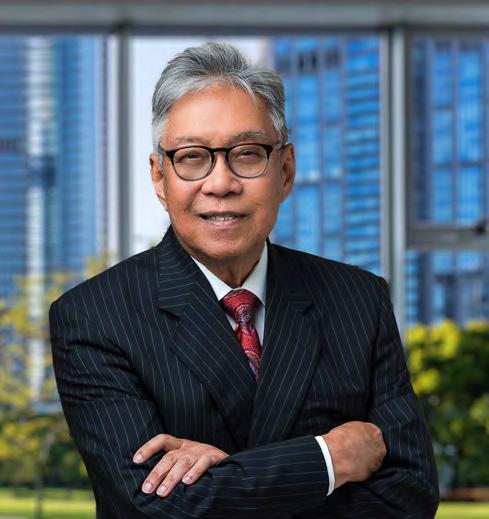
None of his success or achievements, he says, would have happened without STCL Houston. Because of his strong sense of indebtedness to the law school, Quan — managing partner of the Quan Law Group and a South Texas advisory director — made a planned gift to South Texas Law in 2016, thereby becoming a member of the Fred Parks
Legacy Society. He sees it as a way to pay it forward.
He asks his fellow alumni, “Where would you be without the opportunities STCL Houston provided? If you value the way law school opened doors for you, I encourage you to open doors for the next generation. You could actually change the trajectory of their lives.”
Become a Member of the Fred Parks Legacy Society
The Fred Parks Legacy Society, a tribute to our late 1937 alumnus and Texas legal legend Fred Parks, was established in 2007. Through his estate plan, Parks left a bequest to South Texas, making it the largest planned
Membership Benefits
• Invitation to annual appreciation reception
• Recognition in donor report
• Membership gift
• Lapel pin
• Access to exclusive content and events
gift in the 100-year history of the law school. This society serves as a way to honor donors who have made a planned gift and continue Mr. Parks’ tradition of investing in South Texas.
For more information on how to leave your legacy at South Texas, please visit stcl.planmylegacy.org.
46 South Texas College of Law Houston
Law Professor Becomes Intern in Innovative Sabbatical to Bring Fresh Learning to Classroom
Katherine Vukadin, the Charles Weigel II Research Professor of Law who teaches legal writing at South Texas College of Law Houston, recently completed an innovative sabbatical — spending three months as an intern in three different courts to enhance her teaching skills and benefit her law students.
While academic sabbaticals have typically been opportunities for faculty to research and write, with the end goal of publishing an article or book, professors today may develop experiential sabbaticals that enhance and refresh their understanding of the way law is practiced now.
Vukadin researched sabbaticals when planning her own, and she found other law professors providing pro bono services or working with the district attorney’s office. She did not find evidence of anyone serving as an intern for a court.
“I wanted to do something different... something that would give me the opportunity to learn more about persuasive writing for judges,” Vukadin said. “I wanted a project that would bring fresh knowledge to my students and strengthen my teaching — and court is so interesting.” She received approval and active support for her innovative sabbatical from the administration at South Texas. “Dean Michael Barry and Associate Dean Ted Field loved the idea and helped pave the way for it to happen.”
Vukadin had three “first days of work” during her sabbatical. “It was exciting,” she said. Her goal was to understand the changes that had taken place since she was involved in writing for a judge as a practicing attorney. She wanted to share with her students what really happens in court and what judges expect from lawyers’ writing.
The judicial trio who welcomed Vukadin into their courts were Judge Robert K. “Bob” Schaffer ’84, a South Texas Law graduate who presides over the 152nd Civil Judicial District Court in Harris County; Judge George C. Hanks, Jr. of the Federal District Court of the
Southern District of Texas, Houston Division; and Judge Jennifer W. Elrod, a circuit judge on the U.S. Court of Appeals for the Fifth Circuit with chambers in Houston.
“My experience exceeded my high expectations,” she said. “I was not merely observing courtroom activities. I also was reading briefs and talking to the judges about particular points to emphasize with students. The judges were frank and helpful, and generous with their time. They were interested in helping train the next generation of lawyers. And I became friends with their clerks and staff.”
Leaves of absence are among the most important means by which the teaching effectiveness of faculty members may be enhanced, their scholarly usefulness enlarged, and an institution’s academic program strengthened and developed.
– The Academic Senate for California Community Colleges, Education Policies Committee 2006-07, Sabbaticals: Benefitting Faculty, The Institution, and Students
The results of Vukadin’s unique experience will ripple through the legal community and have a positive impact. Students will benefit, as she incorporates her findings into her teaching. She instructs first-year students for two consecutive semesters on one of the core elements of legal practice.
“Legal writing is not unlike a foreign language that must be learned,” Vukadin said. “It is vital; it is the skill that lawyers are judged on early in their careers.”
She also will be sharing what she learned with colleagues around the country, authoring articles, and presenting at conferences. Eventually, judges will benefit as current law students become young attorneys, better equipped to write for their audience — the courts.

Vukadin said three things from her sabbatical stand out as especially important to pass along to others: know your audience, be prepared, and comport yourself well in the courtroom.
“Trying to fully understand the reader of your writing is critical,” she said. “You should know the context of the court, the circumstances the judge is operating under, and how to write to get your point across to the court. What can you learn about the judge? Does he or she have a clerk, no clerks, many clerks? How many cases are heard? Do they value deep explanations or quick, concise descriptions of the situation?”
Also, each court has its own written “local rules” to help it operate efficiently. Law students are taught to be prepared when presenting. “Going the extra mile, beyond points of law and case specifics, making sure you have read the court’s specific rules and abiding by them, will keep you from looking ill prepared.”
Lastly, courtroom comportment is incredibly important. “Lawyers who engage in professional, respectful, collegial civility to all present, including the opponent, are not only behaving ethically, but will put themselves in good stead with the court.”
“I have come away from this project with an even deeper respect for the courts, the Constitution, and the judiciary,” Vukadin said. “This information will definitely contribute to bringing law students into the profession as practice ready. I love teaching, and I believe in what we do here at South Texas.”
stcl.edu 47
FACULTY NOTES
ELAINE A. CARLSON

Stanley J. Krist Distinguished Professor of Law Carlson completed the annual supplement to her treatise McDonald & Carlson, Texas Civil Practice, Volumes 1-6. It is published by Thompson Reuters and available on Westlaw.
AMANDA HARMON COOLEY
Professor of Law and Vinson & Elkins Research Professor

Cooley has written two articles this past academic year which were accepted for publication. One has been published: Establishing an End to Lemon in the Eleventh Circuit, 77 univErsity of miami l aw rE viEw 972 (2023); the other is forthcoming: Quiet Encroachments on School Prayer Jurisprudence, 126 wEst virginia l aw rE viEw (forthComing 2023).
She presented “Teaching Persuasion through Storytelling in Popular Culture and Legal Advocacy” at the Ninth Applied Legal Storytelling Conference Program, London, United Kingdom, July 2023. Additionally, she was selected to serve on the Association of American Law Schools (AALS) Committee to Review Scholarly Papers for the 2024 Annual Meeting.
FRANK FAGAN
Associate Professor

Fagan is part of a research team that measures the ability of Large Language Models like ChatGPT to carry out legal tasks spanning each
element of IRAC. The team consists of 40 law professors and computer scientists. Their benchmark results were published in the paper: LegalBench: A Collaboratively Built Benchmark for Measuring Legal Reasoning in Large Language Models, Advances in Neural Information Processing Systems (2023).
Additionally, he published four articles in 2022-23: When More Isn’t Always Better: The Ambiguity of Fully Transparent Judicial Action and Unrestricted Publication Rules, 75 intErnational rE viEw of l aw & EConomiCs (2023), with Florian Baumann; SPACS, PIPEs, and Common Investors, 25 univErsity of PEnnsylvania Journal of BusinEss l aw 103-39 (2023), with Saul Levmore; Law’s Computational Paradox, 26 virginia Journal of l aw & tEChnology 1-72 (2022); The Un-Modeled World: Law and the Limits of Machine Learning, 4 mit ComPutational l aw rEPort 1-17 (2022).
Fagan served on a panel during the Affirmative Action & Algorithmic Fairness symposium at Stanford Law School (2023), hosted by stanford l aw & PoliC y rE viEw and stanford tEChnology l aw rE viEw. He also received an Award for Excellence in Scholarship from South Texas College of Law Houston (2022-23).
DR. DEREK FINCHAM
Professor of Law and Associate Dean for Online Education & Innovation

Fincham presented remotely on the state of Cultural Heritage Law at a conference organized by the University of Kent in Canterbury, England. He was quoted in a discussion on ArtNet regarding the prosecution on antiquities trafficking charges of former Louvre Curator Jean-Luc Martinez. And his article “Bridging Copyright and Cultural Heritage with the Public Domain” has been accepted for publication in the univErsity of missouri K ansas City l aw rE viEw
HALEY JANKOWSKI Assistant Professor

Jankowski presented at the annual Civil Procedure Workshop at Northwestern’s Pritzker School of Law in May 2023. She performed in the Garland Walker Inn of Court’s 2023 program entitled “The Jury Trial on Trial” – a program that won the First Place National Inns of Court Program award.
R. RANDALL KELSO
Spurgeon E. Bell Distinguished Professor of Law
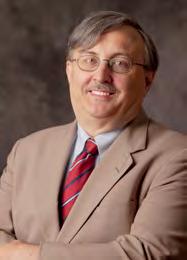
Kelso’s article, “The Proper Structure of Dormant Commerce Clause Doctrine” has been accepted for publication in Volume 59 of the tulsa l aw rE viEw It is expected to be published by Spring 2024.
KATERINA LEWINBUK
Professor of Law and Director of International Programs

Lewinbuk was interviewed on the Aspen Leading Edge Podcast (November 2023) on the topic of Mindful Lawyering. She presented at “Legal Education’s Next Generation: Embracing Online, ChatGPT and Technology in Pedagogy & Practice” (September 2023). She also delivered “Formative Assessments & Innovative Law School Teaching,” a presentation for faculty at California Western Law School (May 2023). She was a panelist on the topic
48 South Texas College of Law Houston
of mindfulness in law schools and a discussant on teaching torts at the August conference for the Southeastern Association of Law Schools (SEALS). She has just published the third edition of her course book titled Connecting Ethics and Practice: A Lawyer’s Guide to Professional Responsibility (Aspen).
EMILIO LONGORIO
Full Time Faculty

Longorio published an article with the Boston College Law Review titled Properly Construing the Just Compensation Clause, 64 Boston CollEgE l aw rE viEw 1378 (2023). He was elected Secretary for the Texas State Bar’s Court Rules Committee and was elected to the Executive Board for the State and Local Government Section of the Association of American Law Schools.
RYAN H. NELSON
Assistant Professor of Law

Nelson published An Employment Discrimination Class Action by Any Other Name, 91 fordham l . rE v 1425 (2023), and presented the article at the 2023 Association of American Law School’s Annual Meeting in San Diego. He was quoted in the Houston Chronicle story, “Texas Agriculture Employees Told to Dress Based on ‘Biological Gender.’”
He organized and moderated a panel providing an update on LGBTQ+ legislation in Texas at the State Bar of Texas’s Annual Meeting in Dallas, TX; presented a work-in-progress entitled Work Discrimination Law’s Exclusions at the 2023 Colloquium on Scholarship
in Employment and Labor Law at the University of Minnesota Law School (October 2023); spoke at his alma mater, the Benjamin N. Cardozo School of Law at Yeshiva University, on a panel entitled “Making a Career Working for LGBTQ+ Rights”; served on the Board of Directors of the National LGBTQ+ Bar Foundation (the only tenure-track law professor nationwide in that role); served on the Council of the State Bar of Texas’s LGBTQ+ Laws Section; and served as Chair of the Association of American Law Schools Employment Discrimination Law Section.
AMANDA J. PETERS
Professor of Law and Godwin Lewis PC Research Professor
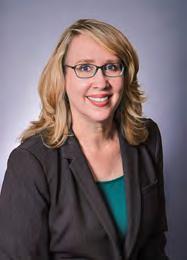
Peters published the third edition of Texas Criminal Procedure (Aspen). She presented “The Limits of Consensual Encounters” at the Texas Criminal Scholars Workshop at University of Houston Law Center, and “How to Publish Bar Course Books” at the Lone Star Legal Writing Conference at Texas Tech University Law School. She cowrote a law review article with alum Grecia Sarda ’22 titled Ending Monell Liability for the Private Prison Industry. It will appear in volume 54 of the sE ton hall l aw rE viEw in 2024.
SCOTT REMPELL
Professor of Law

Rempell’s recently published article, A Blueprint to Reclaim Legal Education from U.S. News (November 1, 2023) outlines an alternative approach to the widely accepted rankings that could positively impact the law school
community in other ways and be a model for undergraduate institutions and other entities that feel shackled by U.S. News’s commercial interest in reducing complex institutions to a single composite score and ordinal rank.
JEFF RENSBERGER
Professor of Law and Charles Weigel II Research Professor of Conflict of Laws

Rensberger’s article, Jefferson’s Ghost: The Local Action Rule in Federal Courts, appeared in the Cardozo l aw rE viEw, vol. 44, issuE 6. (Fall 2023)
CHARLES W. “ROCKY” RHODES
Professor of Law and Charles Weigel II Research Professor of State & Federal Constitutional Law

Rhodes authored two books: Constitutional Law: Foundations, Interpretations, and Commentaries, 1st ed. West Academic Publishing (forthcoming 2024) (with Renee Knake Jefferson) and Questions & Answers: Constitutional Law, 4th ed. Carolina Academic Press 2023 (with Paul E. McGreal).
Rhodes published the article Judicial Process and Vigilante Federalism, 108 CornEll l . rEv. onlinE 125 (2023) (with Howard M. Wasserman), and he was elected Secretary of the Board of Trustees at the July 2023 Annual Meeting of the Southeastern Association of Law Schools (SEALS). He gave the following conference presentations: “Mallory’s Law Office History,” Originalism and Historicism in Civil Procedure Workshop, 2023 Conference, SEALS, Boca Raton, Florida; “Supreme Court Update: Counting to Five in the 2022-23 Term,” Federal Bar Association for the Southern District
stcl.edu 49
FACULTY NOTES
of Texas, Houston, Texas, July 2023; “Vigilante Enforcement, Civil Rights, and the Federal-State System,” Then and Now: Constitutional Changes & Navigating the Law, The Scholar 2023 Annual Symposium, San Antonio, Texas, Feb. 2023; Panelist, Teaching Strategies in Constitutional Law in the Wake of the 2022 Supreme Court Term, West Academic Publishing & Foundation Press Lunch & Learn Event, 2023 AALS Annual Meeting, San Diego, January 2023.
Amicus briefs filed by Rhodes include Brief of Amicus Curiae Professor Charles W. Rhodes in Support of PlaintiffAppellee, Singleton v. Taylor, _ F.4th _ (11th Cir.) (No. 23-11163) (primary author and co-counsel) and Brief for Amicus Curiae Civil Procedure and Federal Courts Professors in Support of Plaintiffs/Appellants, Doucet v. FCA-US LLC, 210 N.E.3d 393 (Mass. 2023) (No. SJC-13354) (co-author, co-counsel, and listed amicus).
He was also invited to author several guest posts on Prawfsblawg, and his scholarship was highlighted in many other posts.
Interviewed over 30 times by the media in 2023, Professor Rhodes’ comments appeared in the New York Times, Washington Post, Wall Street Journal, USA Today, Dallas Morning News and on numerous news broadcasts including National Public Radio’s Morning Edition, the Texas Standard Public Media, the Texas Tribune, the Houston Public Media programs Houston Matters and Town Square with Ernie Manouse, and the Dallas Morning News.
D’ANDRA MILLSAP SHU
Assistant Professor of Law
Shu serves as Chair-Elect of the AALS Disability Law Section, and made the following presentations in 2023: “Should Writing an Appellate Brief Be Included in the Standard 1L LRW Curriculum?” Discussion Group Moderator, Association of Legal Writing

Directors
2023 Biennial Conference, July 2023; “Texas Citation Teaching Tips,” 2023 Lone Star Regional Legal Writing Conference, Lubbock, Tex., Apr. 2023; “The Pandemic’s Impact on Remote Work Accommodations,” AALS 2023 Annual Meeting, Employment Discrimination Law Section’s Panel on How the Pandemic Changed the Law Beyond the Pandemic, San Diego, CA, Jan. 2023.
Her publications include Remote Work Disability Accommodations in the Post-Pandemic Workplace: The Need for Evidence-Driven Analysis, 95 tEm P l . r E v. 201 (2023), and Disability Law: Cases, Materials, Problems (including Teacher’s Manual) (with Professor Laura Rothstein and Professor Ann C. McGinley) (7th ed., forthcoming Carolina Academic Press 2024).
Shu was interviewed by Bloomberg Law and quoted in an article on remote work disability accommodations.
DRU STEVENSON
Professor of Law and Wayne Fisher Research Professor

Stevenson participated in a LegalOn research project that advances the understanding of how AI can assist lawyers and assess its current strengths and limitations. The researchers tested large language models (LLMs) against 500 simulated exam questions created by Stevenson. He designed the questions to have the same format and style as the questions on the current MPRE. Each LLM was tested using
a “zero shot” approach, which involves no prior training about legal ethics. GPT-4 performed best, the researchers found, answering 74% of questions correctly and outperforming the average human test-taker by an estimated 6%. Claude 2 answered 67% correctly. GPT-3.5 answered 49% correctly and PaLM 2 answered 42% correctly.
“That AI can pass the legal ethics exam marks a turning point not only for legal technology but also for the practice of law,” said Stevenson. “The responsibility for ethical decisions will always remain firmly with legal professionals, but this study shows the potential for technology to assist the legal community with consistently meeting high ethical standards.”
KATHERINE VUKADIN
Professor of Law and Charles Weigel II Research Professor
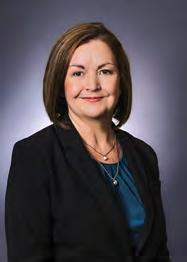
Vukadin’s article, Outside the Ivory Tower: How Law Students Benefit When Their Professors Revisit Practice, was accepted for publication in the orEgon l aw rE viEw. Her panel discussion, “The Experiential Sabbatical: How a Semester in Practice Can Reignite Your Career and Inspire Your Students,” was accepted for presentation at the 2024 AALS Annual Conference in Washington, D.C. Vukadin continues to serve as Managing Editor of the Monograph Series of the Legal Writing Institute and as an Editorial Board Member of the Journal of the Legal Writing Institute.
50 South Texas College of Law Houston
Rhodes
, continued
KENNETH WILLIAMS Professor of Law

Williams coauthored Criminal Law: Concepts to Courtroom, published by Carolina Academic Press; authored If Black Lives Really Matter We Must End Traffic Stops!, to be published by William & Mary Journal of Race, Gender and Social Justice and served as a commentator on “Slavery and the Constitution” by Professor Randy Barnett (Georgetown Law Center), sponsored by the Federalist Society.
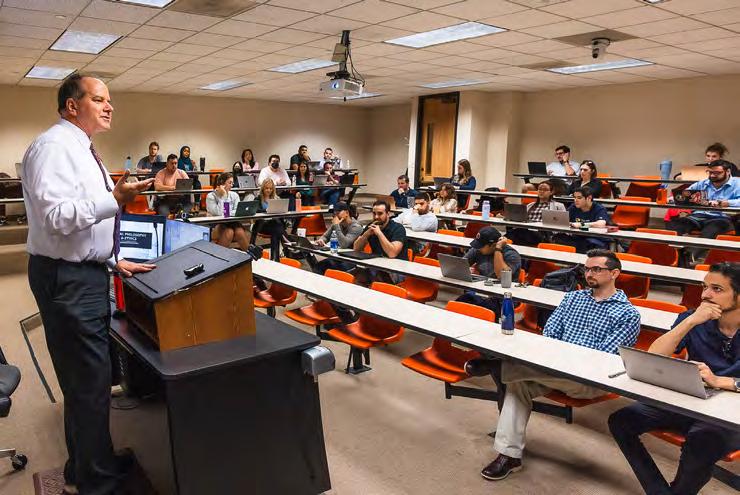
STCL HOUSTON RECEIVES NATIONAL RECOGNITION FOR INNOVATIVE NEGOTIATING PRACTICUM

Professor Debra Berman and the Frank Evans Center for Conflict Resolution (FECCR) at South Texas College of Law Houston received national recognition in 2023 when the Bloomberg Law School Innovation Program honored the law school’s Inter-School Negotiation Practicum.
The practicum, developed by Berman, was a top-scoring submission in the Innovation & Pedagogy category. More than 60 law schools from across the country submitted applications to Bloomberg Law’s inaugural Law School Innovation Program, including Harvard, Baylor, Texas Tech, St. Mary’s, and Emory.
“We are honored the practicum has been recognized nationally as an innovative way to teach negotiation skills to law students,” said Berman, director of the FECCR. “Students appreciate the opportunity to enhance their skills in an environment that more closely aligns with practice.”
The center serves as the focal point for dispute resolution education within STCL Houston. The Frank Evans Center educates students in the theoretical foundations and practical applications of dispute resolution processes such as negotiation, mediation, and arbitration.
stcl.edu 51
Prof. Dru Stevenson presents engaging class lecture in fall 2023
Three Long-Time South Texas Faculty Retire, Leave Impressive Legacy of Excellence
For a combined 106 years, Professors Phillip Page, Mark Siegel, and Mark E. Steiner, Ph.D., taught aspiring lawyers attending South Texas College of Law Houston. Their influence was deeply felt, and alumni and colleagues had quite a lot to share about them once their retirements were announced.
After almost 39 years, Professor of Law Phillip Page completed his last day on the full-time faculty in February 2023, noting it was “a good and happy run with doubtless some years left for other interests.”
In a note to the campus, he said, “Only my wife, daughter, and a few special friends have meant more to my life than South Texas. I will be forever grateful; what a charmed life you have all given me.”
While he is no longer a full-time faculty member, Page continues his involvement with the trademark clinic on campus. When he came to campus in 1984, he was the first professor to focus on intellectual property law (while always teaching Contracts).
“You made Contracts a joy!” wrote alumna Taylor Fuechec Kresta ’22, from section C in fall 2019. “You were hands down the best professor I had during my time at STCL Houston…. Your use of props and wild stories made the learning natural, second to the laughter.”
Another alumna, Christine Herron ’10, added, “Professor Page was one of my favorite professors of all time — and I have had a lot! I still know my general contract information 15 years later, even though I don’t work with or write contracts.”
Professor of Law Mark Siegel retired after 33 years of teaching courses on tax, estate planning, and contracts.
One of his former students, Jennifer Michalik ’11 said about Siegel, “Everything I know about federal income tax is because of him, and everything I don’t know about federal income tax is because of me. Enjoy your retirement!”
Alumnus James M. Alpert ’93 said he had no interest in tax law as a career while at South Texas but appreciated Siegel’s enthusiasm for his subject matter so much that he ended up taking Advanced Income Tax.
Cory Chandler ’99, County Judge, 13th Judicial Circuit, added, “What a phenomenal professor. Thank you for your contribution to my education and to that of countless others.”
Dr. Mark Steiner, professor of law for 34 years, earned a Ph.D. in history in addition to his J.D., and he published the award-winning book Lincoln and Citizenship in 2021 (Southern Illinois University Press). Throughout his career, he spent much of his time outside the classroom providing pro bono legal service to underserved populations across Greater Houston.
One alumnus, Collin Sheldon ’15, wrote about Steiner, “Is there a cooler human?... I will never forget seeing your picture on a full-page ad in our Beaumont newspaper thanking you for all the aid you provided victims after Hurricane Harvey — and proudly telling colleagues, ‘That was my favorite professor!’”
Honored twice nationally for exceptional teaching and numerous times for pro bono service, Steiner’s favorite courses to teach were Texas Pretrial Procedure and Consumer Transactions. He helped many students prepare for the bar exam through the years, which gave him great satisfaction.
“Professor Steiner is a hallmark of selfdiscipline, respect, and a character worth emulating,” wrote alumnus Jon Paul Hoelscher ’05. “He is a class act. Thank you for the lessons in life and law (and some great Abe Lincoln facts) and your tenure supporting both our law school and the community.”
From the entire South Texas community, best wishes to Professors Page, Siegel, and Steiner on your retirement!



52 South Texas College of Law Houston
Phillip Page
Mark Siegel
Dr. Mark Steiner
Five New Professors Begin Teaching at South Texas in Fall
Five new faculty members joined South Texas College of Law Houston’s teaching roster beginning in the fall semester of 2023.

Claire Andresen, an accomplished prosecutor, was appointed as a visiting assistant professor at South Texas. Andresen spent two years as assistant general counsel for a large public school district and a decade as a successful assistant district attorney –working first in Harris County and then in Fort Bend County.

Christina Crozier, an expert in appellate law with a passion for teaching, joined the law school as a visiting assistant professor of legal research and writing. Before joining South Texas, Crozier practiced 17 years in the appellate practice group of Haynes Boone. She is board certified in civil appellate law by the Texas Board of Legal Specialization.



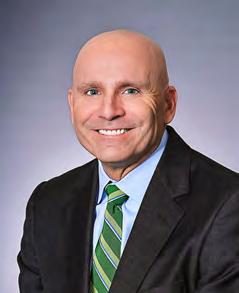
Maureen Duffy is a visiting professor of law. Previously, she was an associate professor at the University of Calgary in Alberta, Canada, and was a litigator in private practice in Chicago. She held positions in the trial and appellate divisions of the Office of the Cook County Public Guardian and served as an administrator and attorney for the Illinois Department of Children and Family Services.
Thomas Hogan, a former chief prosecutor from Chester County, Penn., joined South Texas as a visiting assistant professor. After practicing law at a major international law firm and litigation boutique, he served as a federal prosecutor for the U.S. Department of Justice. Twice elected to serve as the district attorney in Chester County, Hogan also chaired the Liberty Mid-Atlantic High Intensity Drug Trafficking Areas program and coordinated drug law enforcement for state and local organizations across a three-state area.
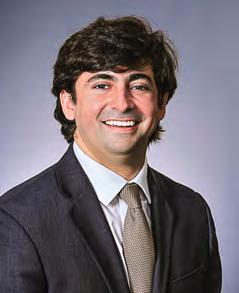
Emilio Longoria joined the law school as an assistant professor of law. The native Houstonian was a civil litigator and is Of Counsel at Marrs, Ellis, & Hodge LLP. He has taught high school, worked in the Texas Legislature, and clerked for U.S. District Court Judge George C. Hanks, Jr. of the Southern District of Texas. Longoria is a member of the Texas Bar College and serves on the Board for the Galveston County Bar Association.
stcl.edu 53

Community Leaders Join South Texas for Centennial Founder’s Day
A day of celebrations marked South Texas College of Law Houston’s Centennial Founder’s Day on April 13 on the campus of Houston’s oldest law school. Addressing an audience of some 500 alumni, community leaders, faculty, staff, and students, STCL Houston Board Chair Genora Boykins ’85 kicked off the day’s activities — welcoming the audience and a slate of guest speakers that included judges, community leaders, and federal, state, and local officials.
From Texas Supreme Court Chief Justice Nathan Hecht to Houston Mayor Sylvester Turner, each emphasized the significant contributions South Texas has made to the community in its first 100 years. Dave Oelman, a member of the South Texas Board of Visitors and descendant of Dean J.C. Hutcheson, set the tone for the day with a look back at the history of South Texas and its role in Houston’s early growth. President and Dean Michael F. Barry’s multimedia presentation, “STCL at 100,” highlighted the law school’s many accomplishments over the last century and its distinguished place in the region’s legal community.
“I stand here today in awe of what this law school has accomplished over a century… the opportunities created, the doors opened, the minds sharpened, the lives changed,” Barry said. “South Texas has contributed greatly to the legal community and has changed the face of law in Houston, in Texas, and across the country.” To read more, see https://www.stcl.edu/centennial
South Texas College of Law Houston
FOUNDER’S

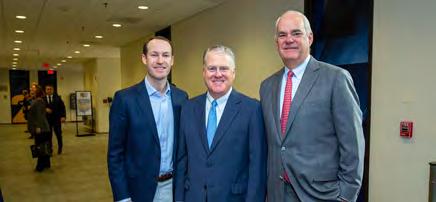


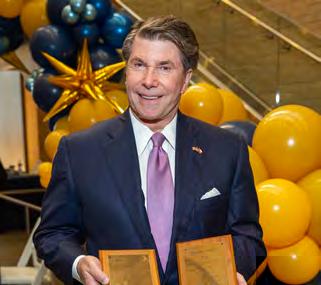
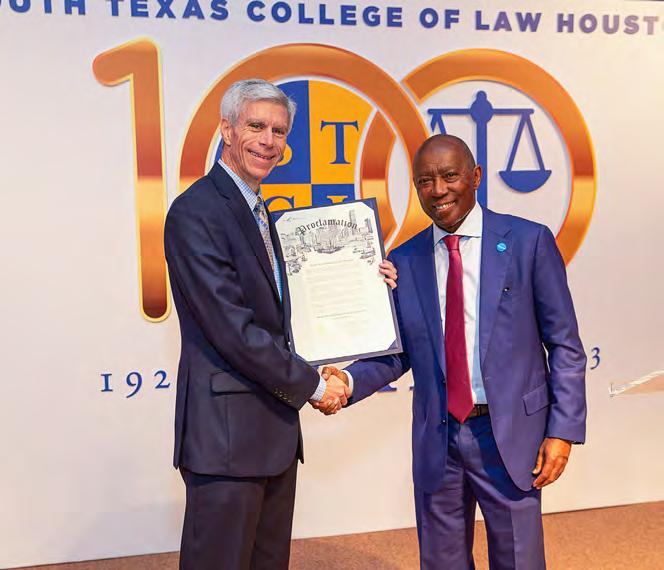 DAY
1. Atrium display
2. Thomas Smith, Michael Donaldson ‘87, Townes Pressler Jr.
3. Centennial socks
4. Display in Emilie Slohm
5. Carly Miller (Abbott) ‘23 and Dean Michael F. Barry
6. Executive Vice President Emerita Helen Jenkins, Prof. Pamela George
7. David Oelman
8. Chief Justice Nathan Hecht and Benny Agosto ‘95
9. Board Chair Genora Boykins ‘85 and Dwight Boykins
10. Steve Laird ‘80
DAY
1. Atrium display
2. Thomas Smith, Michael Donaldson ‘87, Townes Pressler Jr.
3. Centennial socks
4. Display in Emilie Slohm
5. Carly Miller (Abbott) ‘23 and Dean Michael F. Barry
6. Executive Vice President Emerita Helen Jenkins, Prof. Pamela George
7. David Oelman
8. Chief Justice Nathan Hecht and Benny Agosto ‘95
9. Board Chair Genora Boykins ‘85 and Dwight Boykins
10. Steve Laird ‘80
1 2 3 4 5 6 7 9 10 8 11
11. Dean Michael F. Barry and Houston Mayor Sylvester Turner
SOUTH TEXAS COLLEGE OF LAW HOUSTON
ADMINISTRATION
Michael F. Barry President and Dean
Cathy Burnett
Vice President and Associate Dean for Experiential Education
Darcy Douglas ’07
Vice President, Advancement and Alumni Engagement
Ted L. Field
Associate Dean for Academics
Dr. Derek Fincham
Associate Dean for Online Education and Innovation
Sharon Finegan
Associate Dean for Faculty
Robert L. Galloway ’91
Vice President, Advocacy, W. James Kronzer Jr.
Distinguished Professor of Advocacy
Maxine Goodman
Associate Dean for Students
Tonya Jackson
Vice President, Chief Financial Officer
Hao Le
Vice President, Chief Operations Officer
Stephanie Maher
General Counsel, Associate Vice President of Compliance and Risk Management
Randy Marak
Vice President, Information Technology
Shelby A.D. Moore
Vice President, Diversity, Equity and Inclusion
BOARD OF DIRECTORS
Executive Committee
Genora Kendrick Boykins ’85
Board Chair
J. Kenneth Johnson ’86
Immediate Past Chair
Darryl M. Burman ’83
Hon. Theresa W. Chang ’96
Stewart W. Gagnon ’74
Chris Hanslik ’95
Randall O. Sorrels ’87
Michael S. Hays ’74, Ex Officio
Members
Michael E. Cokinos
Aparna M. Dave ’02
Ephraim del Pozo ’97
Randy R. Howry ’85
Regina Bynote Jones ’98
Mitchell A. Katine ’85
Nicholas J. Lanza, Jr. ’89
Joseph K. Lopez ’78
Michael W. Milich ’97
Sharon Schweitzer ’89
Jennifer O. Stogner ’06
James D. Thompson III ’86
Chairmen Emeriti
Michael S. Hays ’74
Advisory Directors
Larry Baillargeon ’74
Hon. Robert A. Eckels ’93
Gordon Quan ’77
BOARD OF VISITORS
Michael Donaldson ’87, Chair
Bucky Allshouse ’75
Greg Bopp ’95
M. Carter Crow
Aparna M. Dave ’02
D. Mark DeWalch
Hon. Jennifer Walker Elrod
Hon. George. C. Hanks, Jr.
Regina Bynote Jones ’98
Bill Kroger
Billy Murphy ’06
David Oelman
Townes Pressler, Jr.
Sharon Schweitzer ’89
ALUMNI ASSOCIATION BOARD OF DIRECTORS
Jennifer O. Stogner ’06
President
Alex Gonzalez ’12 Co-Vice-President, Career Networking Committee
Brad Gilde ’04
Co-Vice-President, Career Networking Committee
Tonya Rolland McLaughlin ’06 Vice-President, Admissions Committee
Samantha Torres ’13 Vice-President, Events & Programs Committee
Catina Haynes Perry ’06
Immediate Past President
Byron Alfred ’12
Tim Ballengee ’09
Rick Berlin ’06
Kyrie Cameron ’15
Melanie Cheairs ’89
Robert Cowan ’01
Paul Darrow, III ’07
Eric D’Olive ’11
Samantha Frazier ’11
Hon. Keith Giblin ’89
Katherine Gonyea ’08
Misty Hataway-Cone ’01
James Helton ’14
Lisa Ketai ’84
Xerxes Martin, IV ’11
Troy McKinney ’86
Col. Chris Miner ’94
Lindsey Moorhead ’11
Avi Moshenberg ’12
Ryan Newman ’07
Bill Pritchett ’14
Lisa Ray ’99
Hon. Donna Roth ’87
Jenna Rudoff ’12
Trey Sandoval, III ’04
Carl Shaw ’90
René Sigman ’02
Hon. D’Lisa Simmons ’90
Paul Wyatt ’13
COPYRIGHT 2024, SOUTH TEXAS COLLEGE OF LAW HOUSTON, ALL RIGHTS RESERVED

Thank you for helping us celebrate 100 years of excellence in legal education.
Now, on to our second century!
stcl.edu 3
4 South Texas College of Law Houston NON-PROFIT ORG. U.S. POSTAGE PAID PERMIT NO. 8451 HOUSTON, TX South Texas College of Law Houston 1303 San Jacinto Street Houston, Texas 77002 South Texas College of Law Houston provides a diverse body of students with the opportunity to obtain an exceptional legal education, preparing graduates to serve their community and the profession with distinction. THINK SOUTH TEXAS FIRST! Our students and graduates are practice-ready and eager to apply their knowledge and skills in the workplace. When you fill summer, part-time or permanent positions, please think about our highly qualified South Texas College of Law Houston students and alumni. Contact cso@stcl.edu to connect with our students and graduates. stcl.edu/employers




















































































 1. Julie Donaldson, Michael Donaldson ‘87, Morgan Cuenod, Adie Schlenker
2. Debbie Boniuk ‘89, Judge Bob Schaffer ‘85, Jo Ann Schaffer ‘85
3. Benny Agosto, Jr. ‘95, Judge Pamela Medina, Justice David Medina ‘89, Ben Agosto III ‘18, Jon Agosto ‘21
4. Dwight Boykins, Board Chair Genora Boykins ‘85, Joe Lopez ‘78
1. Julie Donaldson, Michael Donaldson ‘87, Morgan Cuenod, Adie Schlenker
2. Debbie Boniuk ‘89, Judge Bob Schaffer ‘85, Jo Ann Schaffer ‘85
3. Benny Agosto, Jr. ‘95, Judge Pamela Medina, Justice David Medina ‘89, Ben Agosto III ‘18, Jon Agosto ‘21
4. Dwight Boykins, Board Chair Genora Boykins ‘85, Joe Lopez ‘78


 1. Executive Vice President Emerita Helen Jenkins, Crystal Washington ‘14
2. Julia Howry, Prof. Shelby Moore, Baker Howry ‘22, Daniel Howry, Randy Howry ‘85
3. Brad Leigh ‘00, The Spinners
4. Board Chair Genora Boykins ‘85
5. Katie Chatterton ‘08, James Flodine ‘81, Lynne Liberto ‘81, Andy Torrant ‘06
1. Executive Vice President Emerita Helen Jenkins, Crystal Washington ‘14
2. Julia Howry, Prof. Shelby Moore, Baker Howry ‘22, Daniel Howry, Randy Howry ‘85
3. Brad Leigh ‘00, The Spinners
4. Board Chair Genora Boykins ‘85
5. Katie Chatterton ‘08, James Flodine ‘81, Lynne Liberto ‘81, Andy Torrant ‘06








 1. Itze Navarro Soliz ‘93, Maria Carmen Gonzalez
2. Judge Christine Weems ‘00, Will Farmer ‘18, Jen Stogner ‘06, Soroush Montazari ‘19
3. Wendy and Larry Morris ‘86
4. Julia Simonet ‘14, Lee Barry, Dominique HInson ‘14, Mike Barry
5. Melanie Cruthirds ‘21, David Cruthirds ‘90, Rosemary Cruthirds
6. Davion White ‘18, Brittny Mandarino Curry ‘20, Andrea Roth ‘14
7. Elsa and The Hon. E.J. Salcines, Jr. ‘63
8. Mary Lloyd ‘81 and family
9. Prof. Debra Berman and Prof. Scott Rempell with their daughter
10. Jeanna Maxwell ‘14 and family
11. Carolyn and Frank Robertson ‘71
12. Marie Garcia ‘16 and family
1. Itze Navarro Soliz ‘93, Maria Carmen Gonzalez
2. Judge Christine Weems ‘00, Will Farmer ‘18, Jen Stogner ‘06, Soroush Montazari ‘19
3. Wendy and Larry Morris ‘86
4. Julia Simonet ‘14, Lee Barry, Dominique HInson ‘14, Mike Barry
5. Melanie Cruthirds ‘21, David Cruthirds ‘90, Rosemary Cruthirds
6. Davion White ‘18, Brittny Mandarino Curry ‘20, Andrea Roth ‘14
7. Elsa and The Hon. E.J. Salcines, Jr. ‘63
8. Mary Lloyd ‘81 and family
9. Prof. Debra Berman and Prof. Scott Rempell with their daughter
10. Jeanna Maxwell ‘14 and family
11. Carolyn and Frank Robertson ‘71
12. Marie Garcia ‘16 and family





























































 DAY
1. Atrium display
2. Thomas Smith, Michael Donaldson ‘87, Townes Pressler Jr.
3. Centennial socks
4. Display in Emilie Slohm
5. Carly Miller (Abbott) ‘23 and Dean Michael F. Barry
6. Executive Vice President Emerita Helen Jenkins, Prof. Pamela George
7. David Oelman
8. Chief Justice Nathan Hecht and Benny Agosto ‘95
9. Board Chair Genora Boykins ‘85 and Dwight Boykins
10. Steve Laird ‘80
DAY
1. Atrium display
2. Thomas Smith, Michael Donaldson ‘87, Townes Pressler Jr.
3. Centennial socks
4. Display in Emilie Slohm
5. Carly Miller (Abbott) ‘23 and Dean Michael F. Barry
6. Executive Vice President Emerita Helen Jenkins, Prof. Pamela George
7. David Oelman
8. Chief Justice Nathan Hecht and Benny Agosto ‘95
9. Board Chair Genora Boykins ‘85 and Dwight Boykins
10. Steve Laird ‘80
